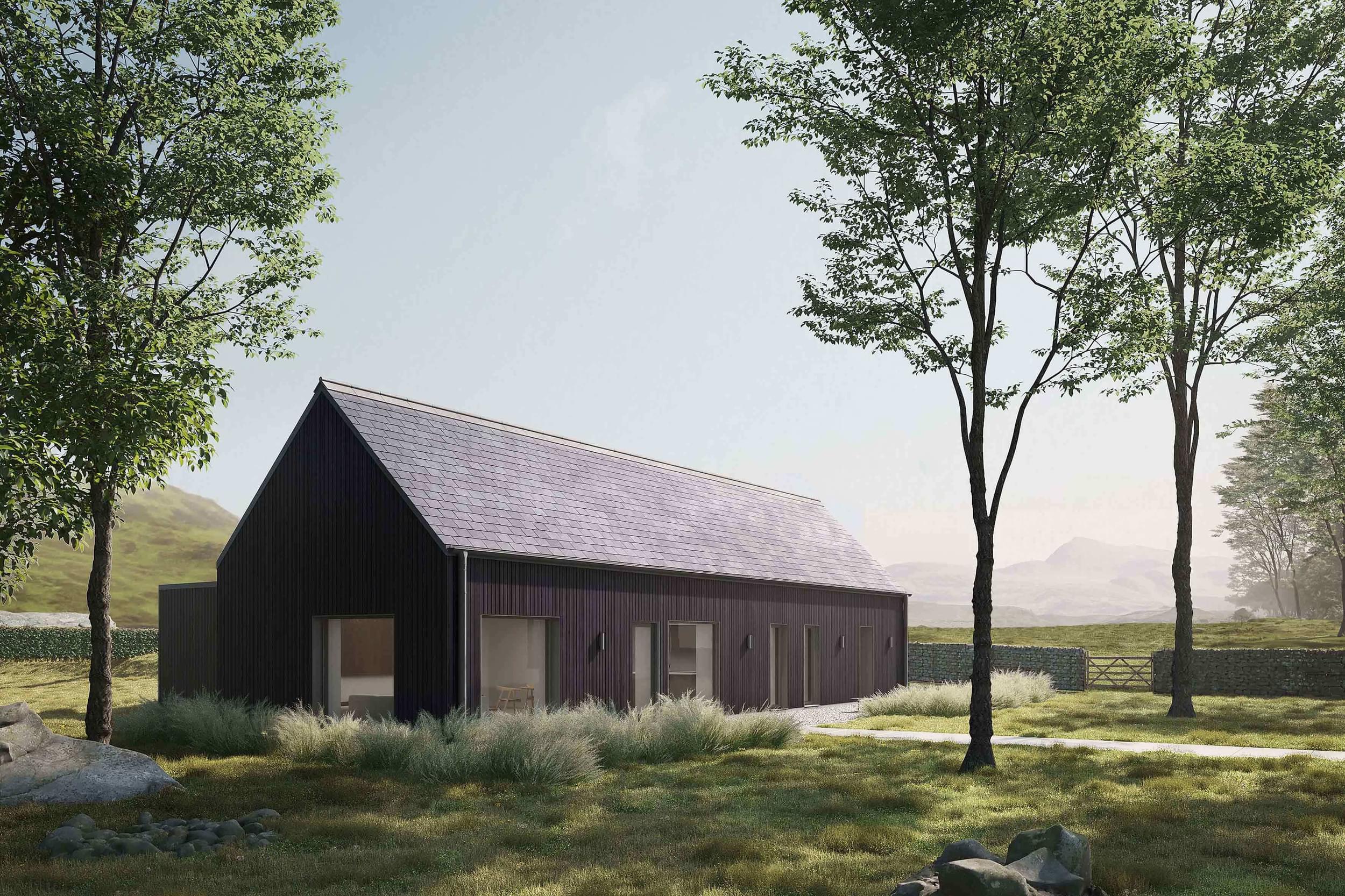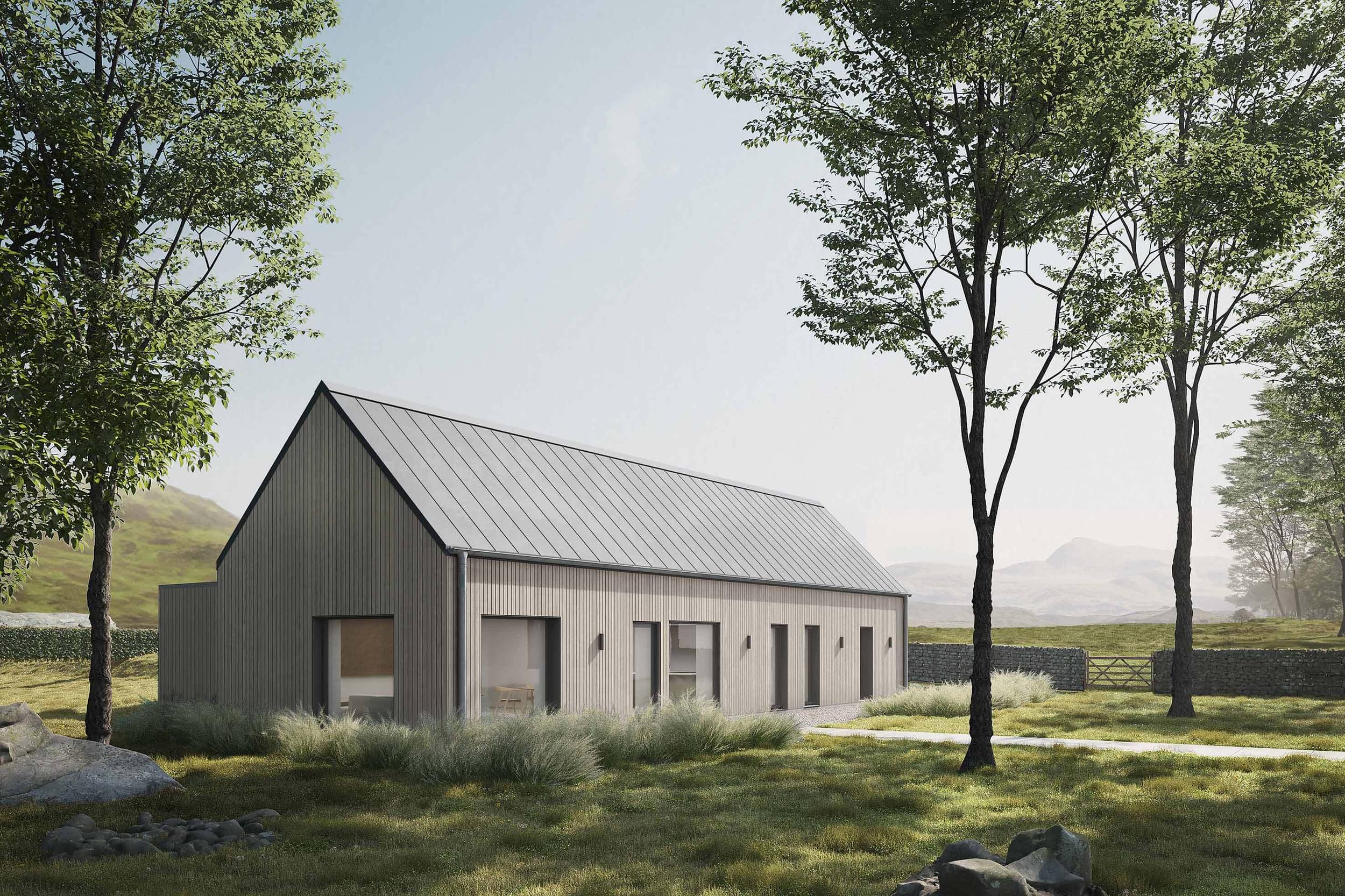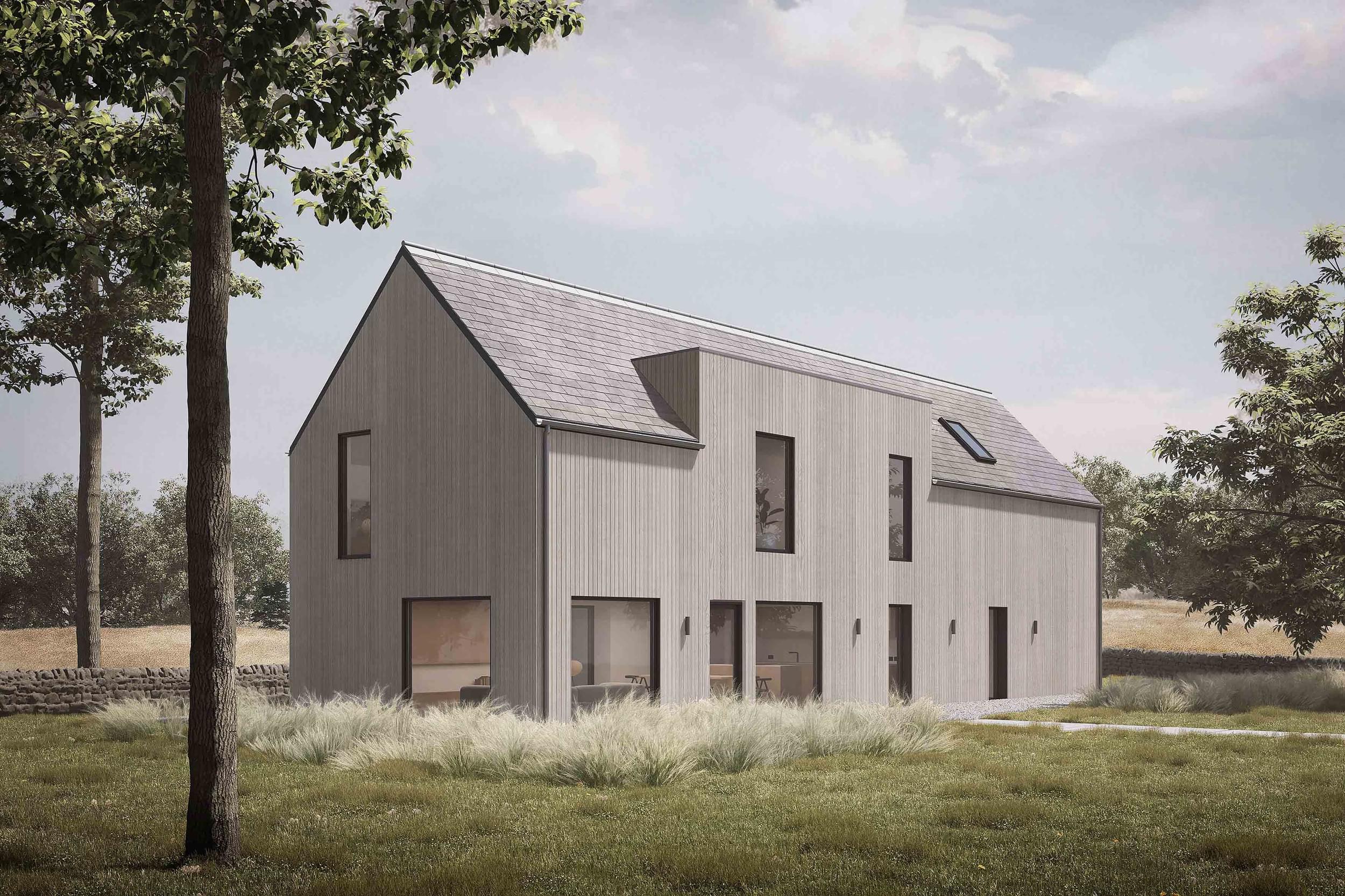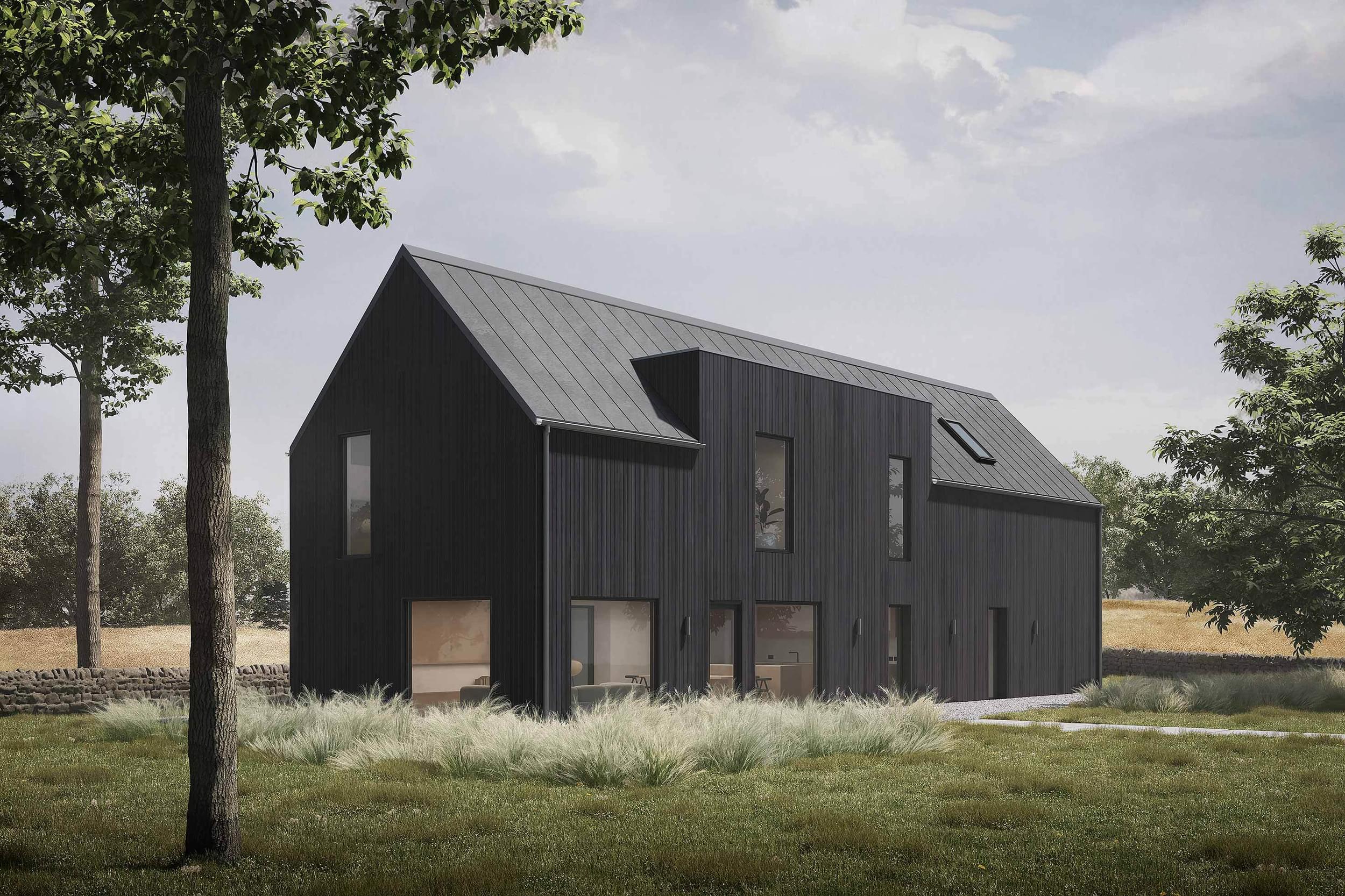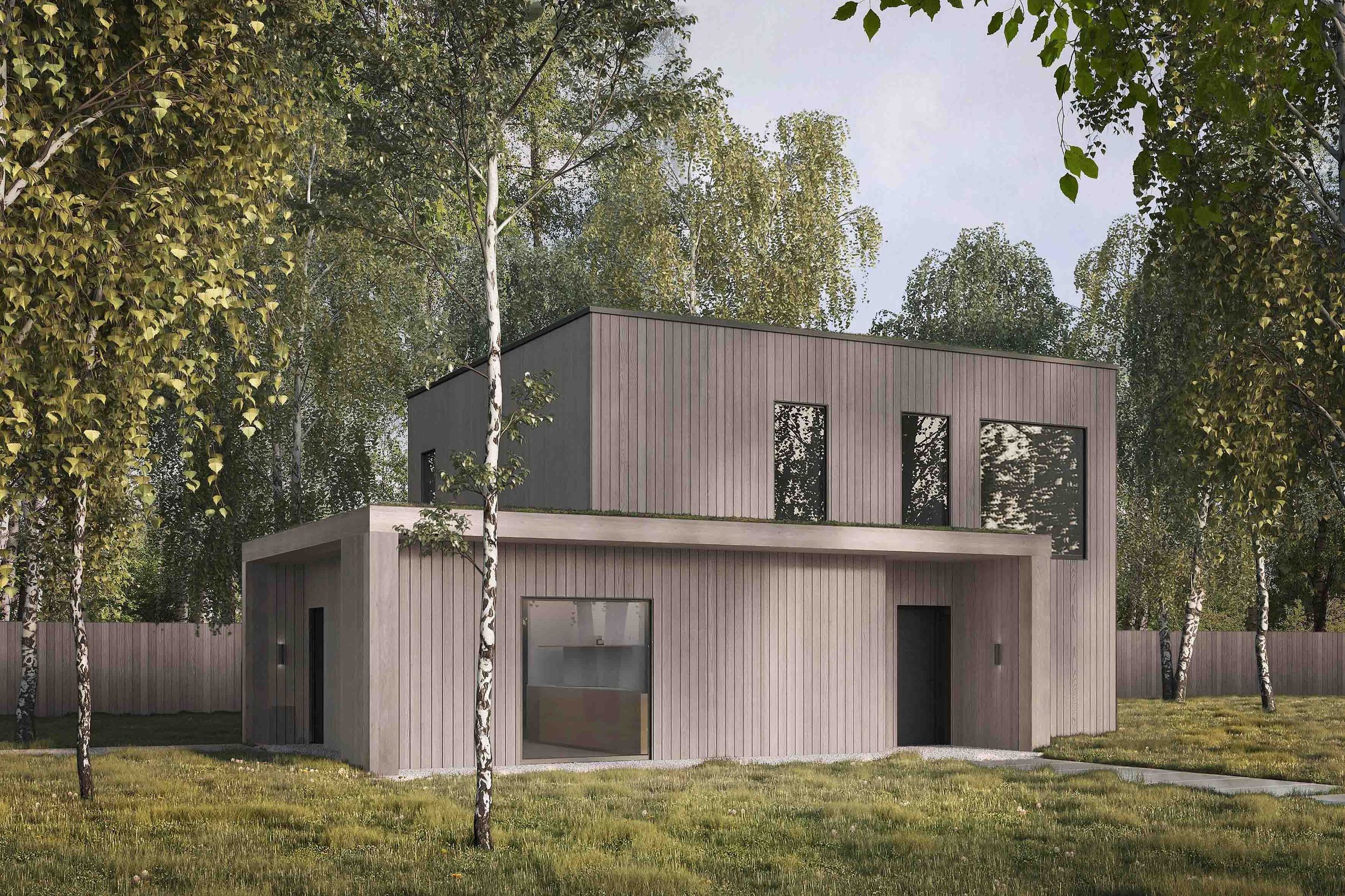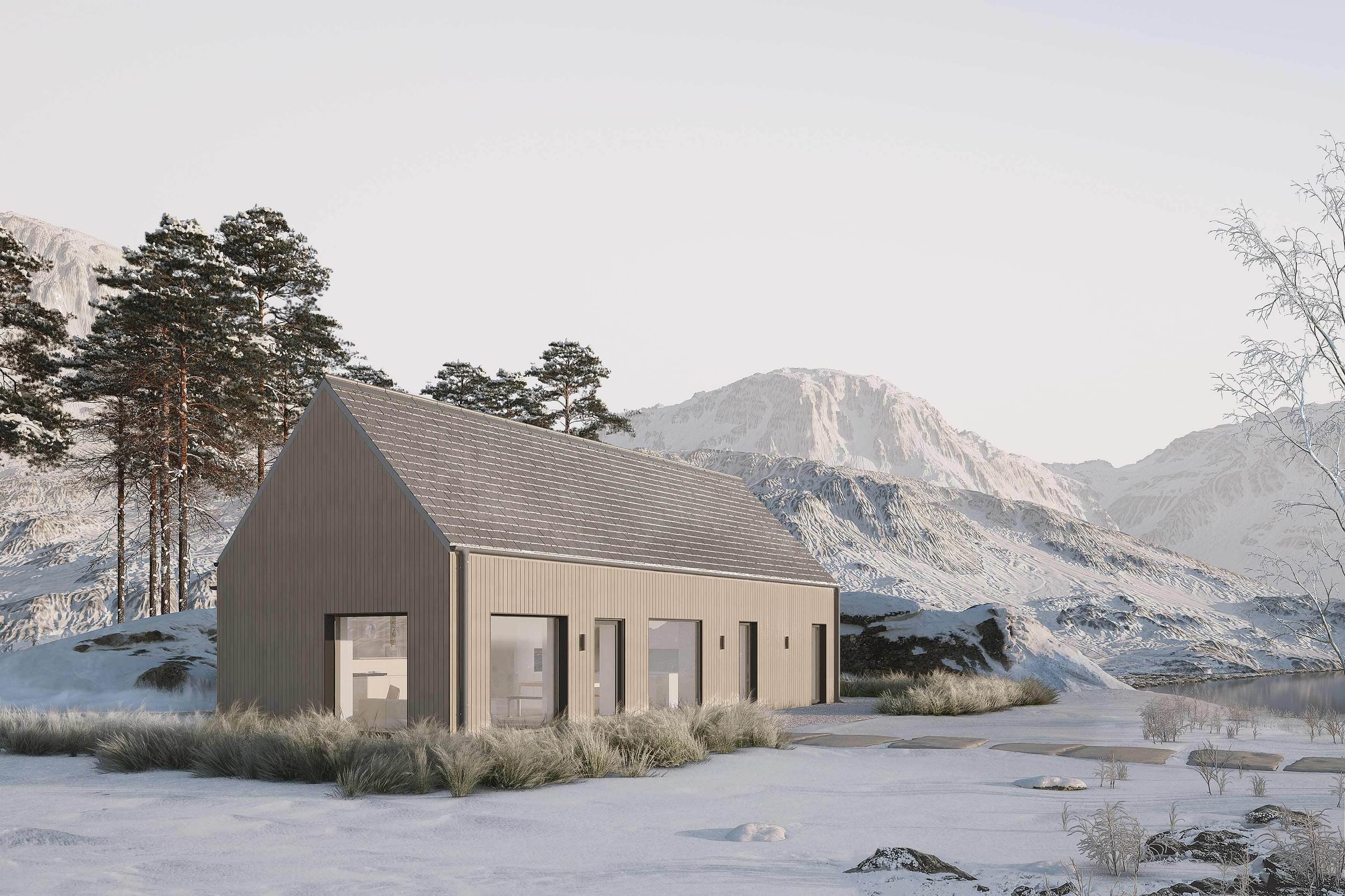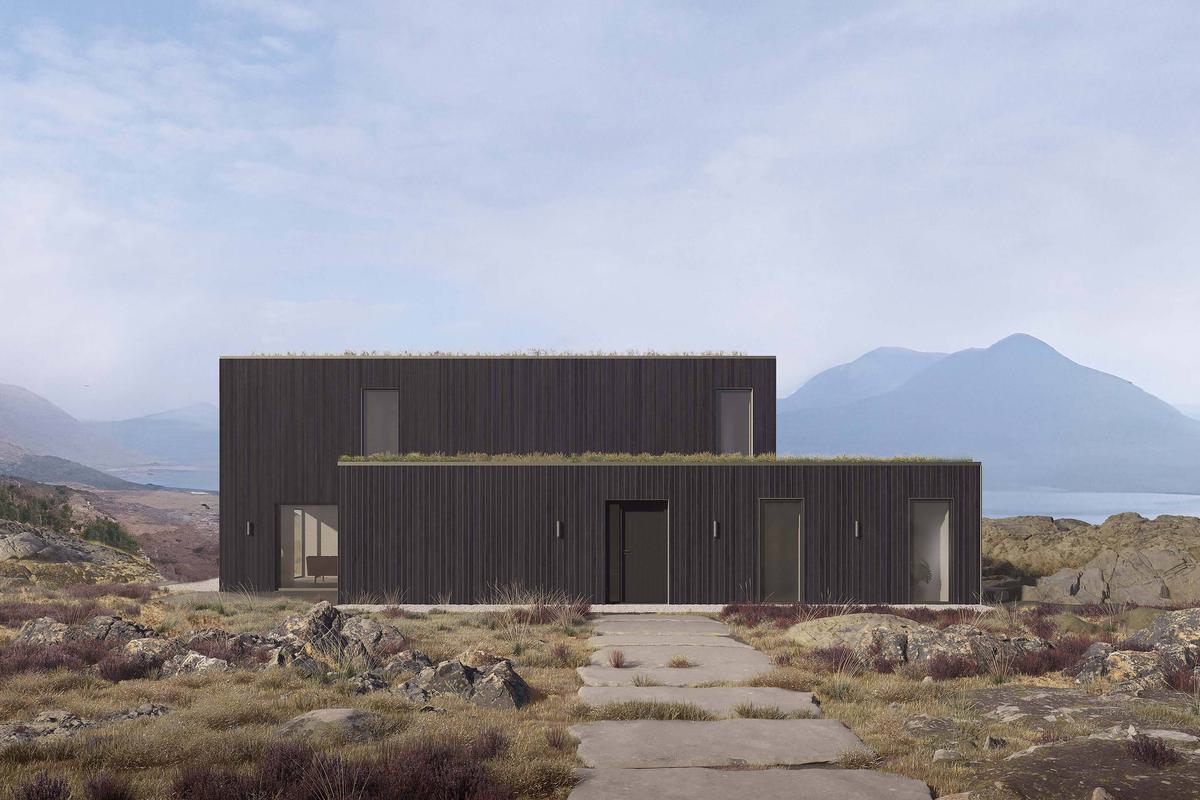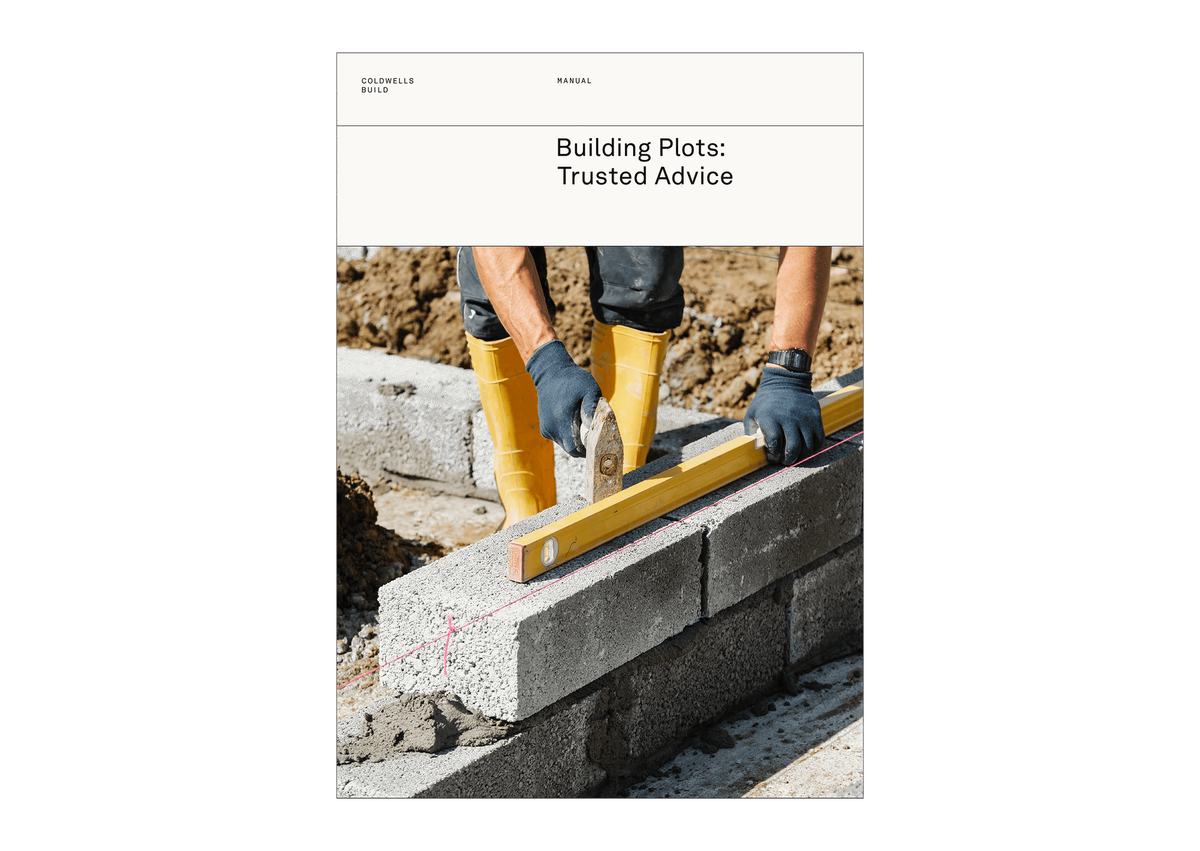

McKinley
Description
The McKinley epitomises comfortable, split-level living. In keeping with the Coldwells Build interior blueprint, the large open-plan living area guarantees a bright, spacious ground floor, with the option to add a permanent dividing wall if desired. There are five double bedrooms and for quiet moments, there’s a snug – ideal for privacy when working from home, or perfect for solo relaxation.
A family bathroom on each level and an ensuite in the master bedroom guarantee comfort. Brilliantly integrated storage across both floors and the option of a double car garage make this the ideal option for anyone looking for unmatched ease and elegance.
Specification
Our Passivhaus homes range in size and scope, flexing to fit any lifestyle. With timeless design, thoughtful layouts and durable materials, the McKinley makes itself at home in any setting.
Discover More
Pricing
For a detailed cost breakdown of the McKinley and what's included within each build service, select your preferred option below.
The Coldwells Build Passivhaus:Frequently Asked Questions
If you’re seriously considering a Passivhaus home, you might be wondering how to begin the process. As award-winning master builders, we’ve compiled a list of our most common queries, with answers to help you plan.
-
For an estimated price of each Coldwells Build Passivhaus, please view the design range.
-
Coldwells Build founder, Ross Booth explains how we use the Passivhaus standard to build and deliver the world's most energy-efficient, healthy homes. For more information, read our Coldwells Build manual, Passivhaus: Explained.
-
If you want to explore customisations, we’ll be happy to assist. All we ask is that you understand this will inevitably add time, money and additional complexity to your project. The Coldwells Build Passivhaus is predesigned, so the layout, engineering and Passivhaus modelling have mostly been taken care of. The designs are tried-and-tested to meet Passivhaus certification criteria and draw upon well-planned layouts and established manufacturing methods, refined over many years. Sticking to these designs means you can count on the quality of your finished home and keep the build time and costs as low as possible.
Of course, you can make some minor adjustments to the design, like tweaking layouts or window placements, but big changes that need re-engineering or affect the manufacture of the Coldwells Build Passivhaus aren’t possible without a redesign. It’s all possible, but this redesign would then fall under our Custom Build service.
-
Coldwells Build founder, Clare Booth addresses the initial cost differences and explains the long-term savings and benefits of building a Passivhaus.
For more information read our journal, ‘Are Passivhaus Homes More Expensive to Build?’
-
This table provides a comparison of what's included in our You Build and Coldwells Build services.
Ready to Buildthe McKinley?
Take the first step towards making it happen by booking a 15-minute call with our director and Passivhaus certified tradesperson, Ross Booth.

Coldwells Build Passivhaus
See All Designs







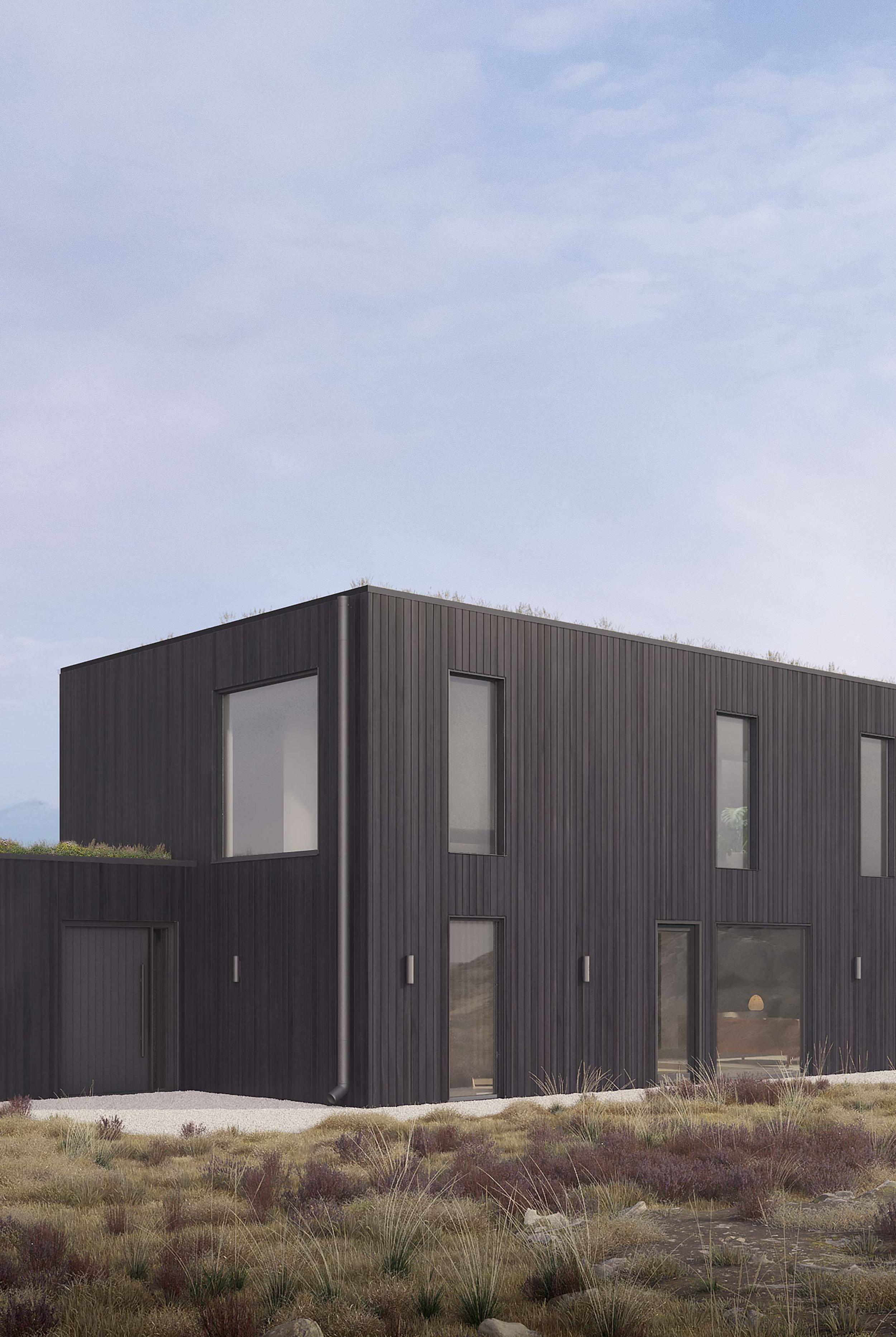





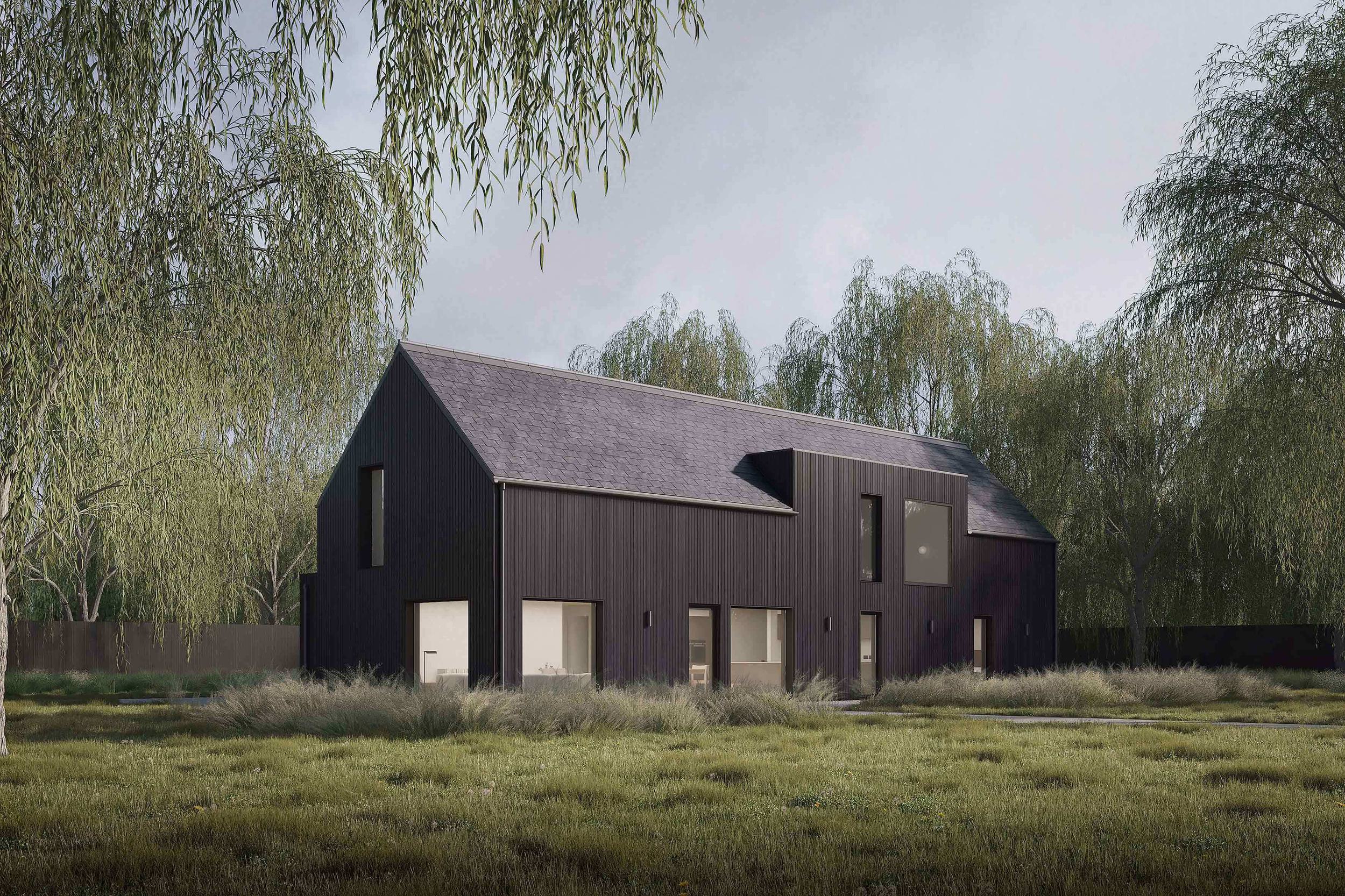
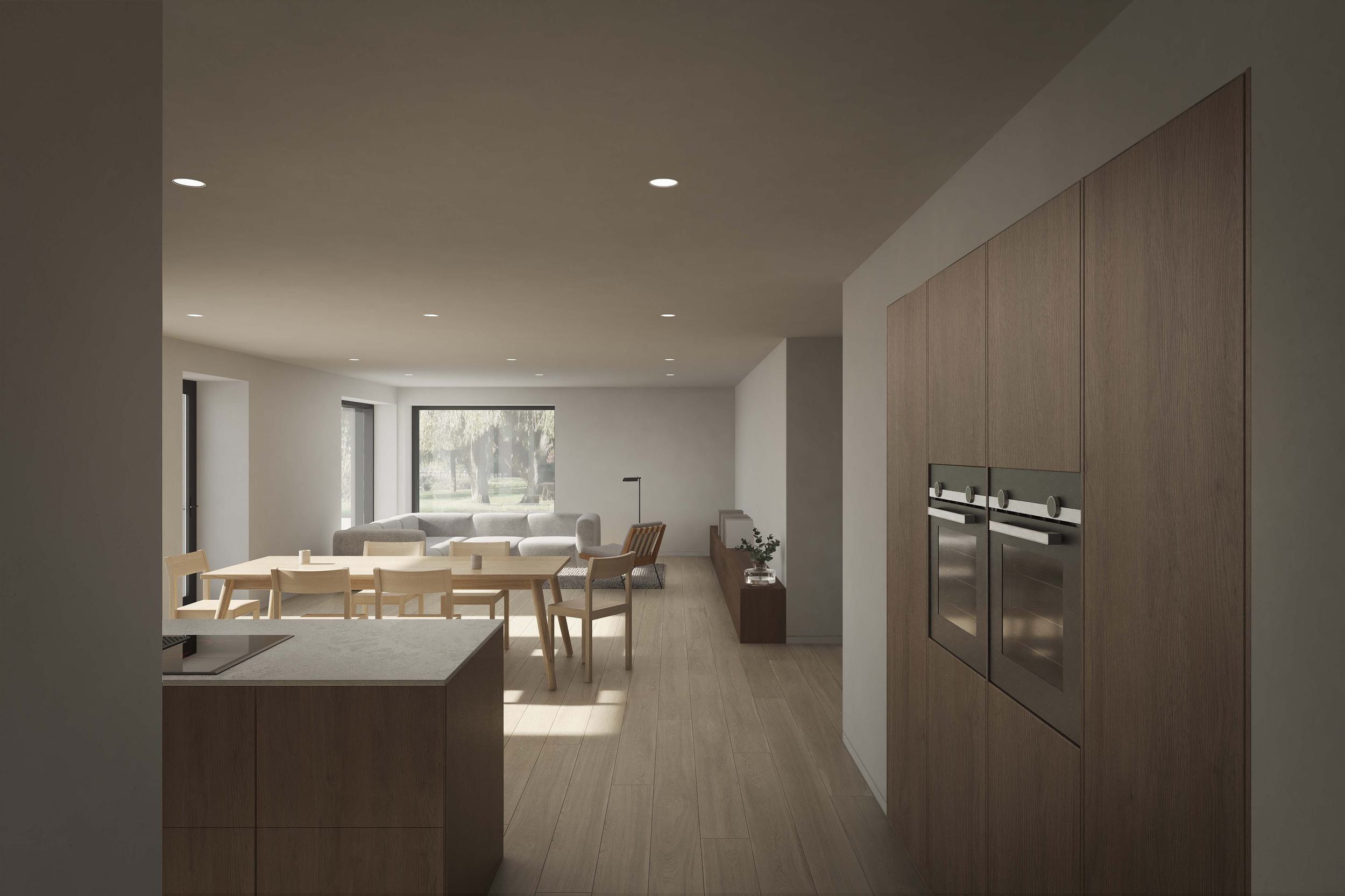
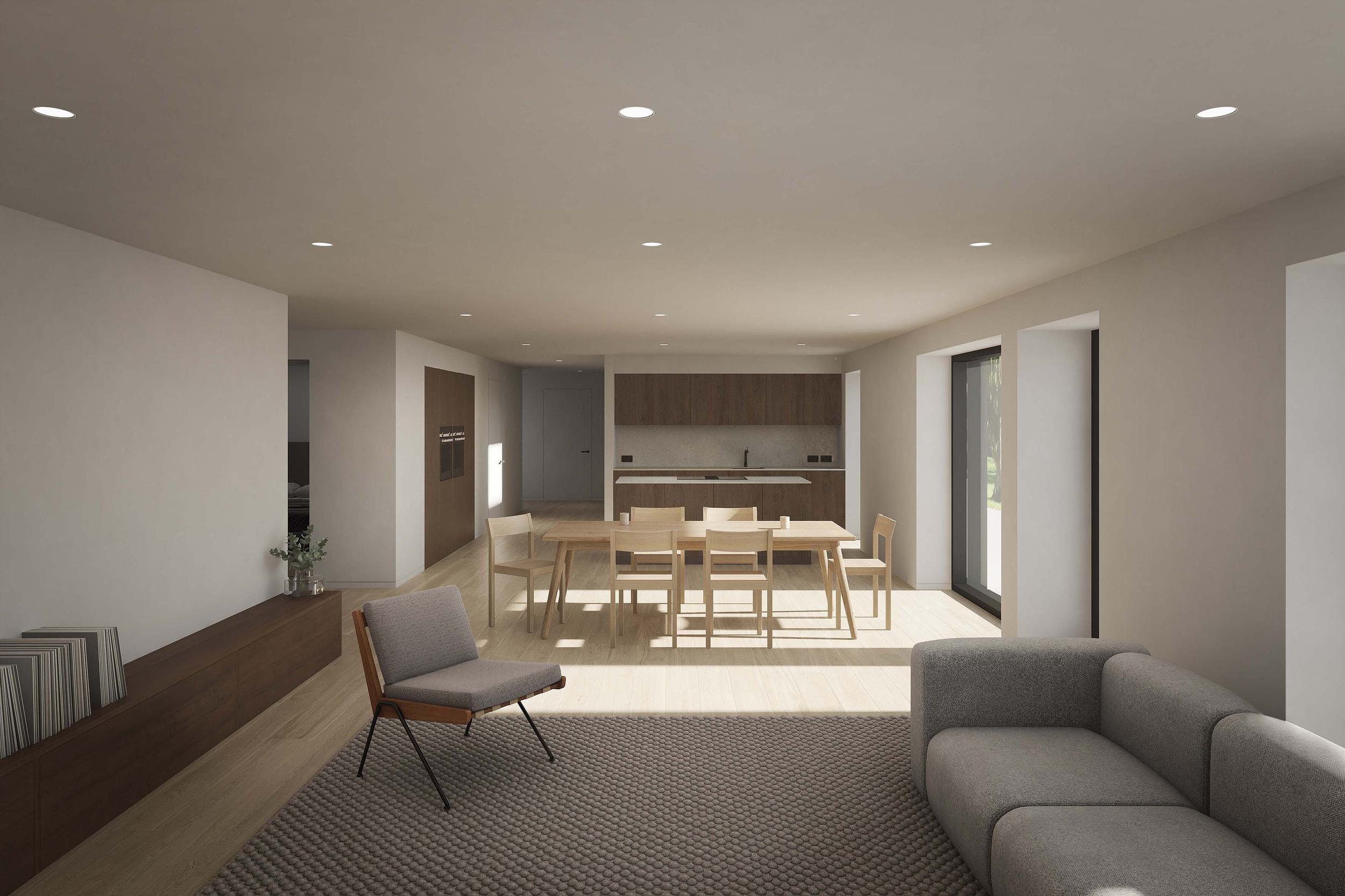

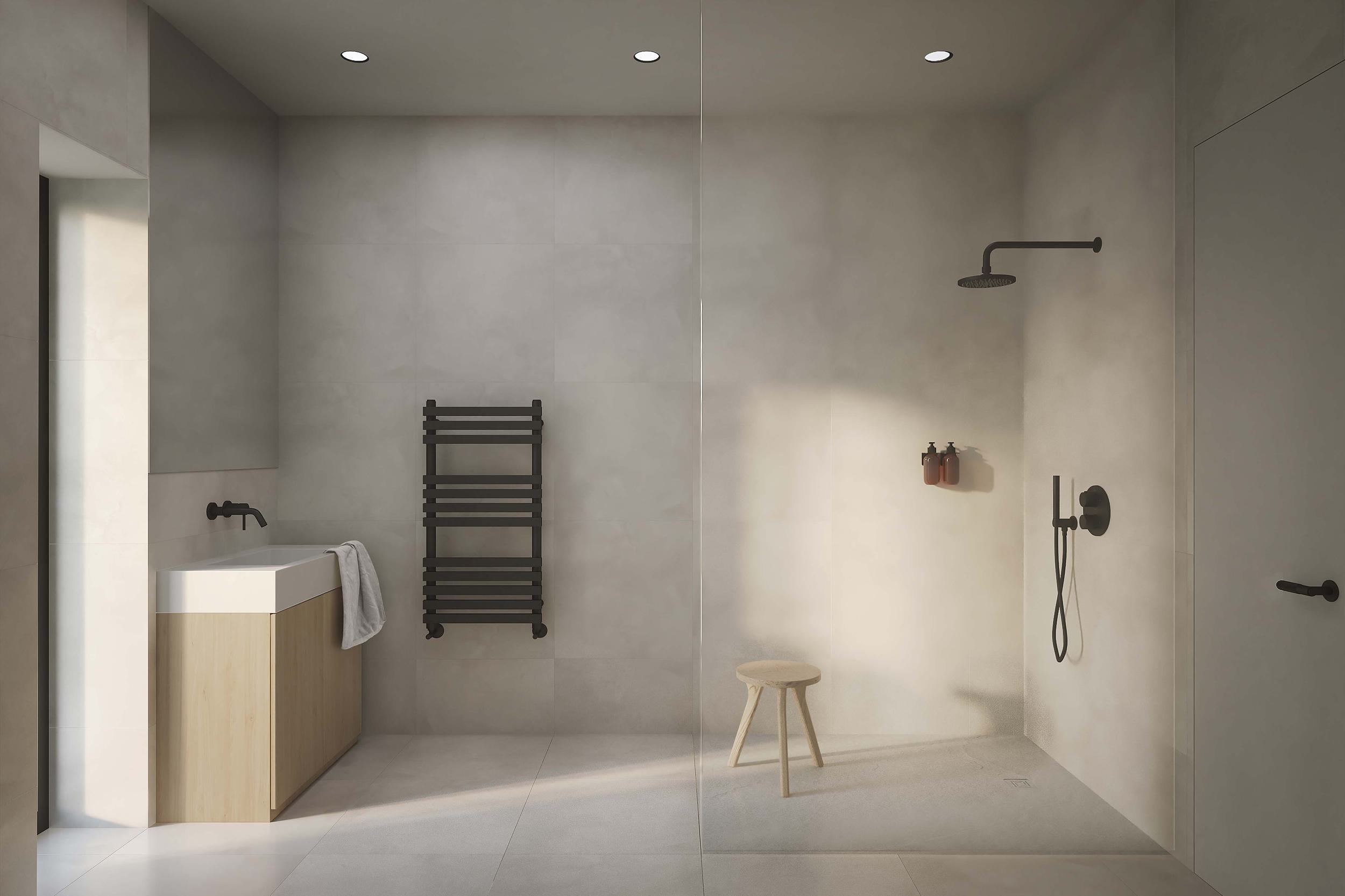
Ready to Buildthe McKinley?
Take the first step towards making it happen by booking a 15-minute call with our director and Passivhaus certified tradesperson, Ross Booth.

Discover More
Design Details
Sizing
Exterior Selections
Every Coldwells Build Passivhaus features a durable timber exterior with customisable cladding colours and roof finishes. Triple-glazed windows and high-calibre external doors means energy-efficiency is guaranteed.
Slate
Slate is ingrained in Scotland’s rich architectural heritage. A super-strong, natural material, it can last over 100 years and withstand the most challenging weather systems. Selected for quality, it is expertly laid by trained specialists and adds a genuine element of classic charm to your otherwise modern Passivhaus.
Metal
The unique snap lock system means panels have a modern, uniform appearance with no visible fixings. Installed in days, a metal roof is exceptionally durable and weather resistant – offering guaranteed protection for your Passivhaus.
The external doors for our Passivhaus homes have been carefully selected to guarantee the highest levels of security and insulation. Double the density of standard external doors, we’ve specified high-calibre models with triple glazing, additional locking points, specialist hinges and extra seals. As a result, you’ll feel and hear your door creating a tight seal as it closes, minimising heat loss and keeping your energy bills low.
Windows are central to the design language of our Passivhaus homes. Unlike traditional new-builds, the proportions specified in every Coldwells Build Passivhaus home are guaranteed to maximise the amount of natural light in every room and create a sense of continuity with the great outdoors. High performance triple glazing comes as standard – the third pane traps warmth indoors in the colder months and stops your home overheating when it’s hot outside. The spaces between each pane of glass are filled with Argon gas, which functions as an acoustic and thermal insulator. It reduces outdoor noise, prevents cold glass surfaces and eliminates condensation – warding off mould growth and keeping the atmosphere in your home a healthy one.
Every Coldwells Build Passivhaus structure has high-quality timber exteriors which have been thermally modified. This natural, toxin-free process changes wood’s cell structure by heating it to 210°C. Moisture and resin are removed, creating an exceptionally durable and stable material – with less risk of shrinking, warping or decay. Paint coatings last up to three times longer, reducing maintenance, and in turn, the lifetime cost of the product. Available in a choice of either silver or black, this sustainable timber cladding helps you achieve a much lower carbon footprint than the render or blockwork more typically used for modern homes.
Designed to enhance any Coldwells Build Passivhaus, our optional double garage follows the same aesthetic language as the rest of your home. With space for two vehicles, this generous addition provides the perfect space for additional storage or for projects that can’t be completed indoors.
Interior Selections
With a careful use of neutral tones and premium fixtures and fittings, every Coldwells Build Passivhaus has been designed to offer a sanctuary of calm. Muted colour, material continuity and open-plan living areas mean there is space to relax with minimal visual noise.
Large, triple-glazed windows flood each home with natural light, which is proven to increase feelings of happiness. Well-balanced layouts, clean lines and clever integrated storage means the inevitable day-to-day clutter has a place to belong. Textures are hardwearing, easy-to-maintain and stylistically timeless – the perfect backdrop for furnishings and personal touches.
We all strive for a decluttered and well-organised home. The Coldwells Build Passivhaus designs are packed with smart space planning. Depending on the specification, there are built-in wardrobes, under stairs storage and plenty of space to conceal shoes and jackets. Kitchens and bathrooms are well-appointed with integrated storage.
Our wall paint is ethically sourced from local, UK-based suppliers and guaranteed to give superb coverage. Free from harmful chemicals, these highly pigmented formulations contain high-quality minerals and organic raw materials. The muted, understated shades have been specially selected to fit well within our modern interiors.
Engineered wood flooring is a long-lasting, low-maintenance surface. Manufactured from real wooden layers that are reinforced with a plywood core, each board contains a unique grain detail and choice of two colours (dark walnut or light oak). Interlocking boards are highly resistant to scratches, wear and abrasion, making it ideal for high-traffic areas and a busy household.
Every room has recessed lighting as standard – in matte white or black. These are carefully fitted into the ceiling to offer an even, steady light across each room without cluttering the space.
Fixtures and fittings have been selected for their design, durability, and material quality. Flush-to-wall skirting boards, stainless steel door handles, solid metal power sockets & switches act as a neutral backdrop, ready for you to add your own additions.
Our half-turn staircase comprises two straight flights of stairs, connected by a landing, changing direction by 180 degrees. A compact, modern form, it makes good use of space, neatly fitting between two walls with built-in storage below. Clad in engineered wood to match your flooring, integrates seamlessly at ground level for openness and fluidity.
Your home is fitted with a Passivhaus certified Mechanical Ventilation with Heat Recovery system (MVHR). These units act as your home’s lungs – continually pulling exhaust from the most pollutant generating rooms (kitchens, bathrooms) and sucking it through a heat exchanger before carrying it to the outside and returning with fresh, filtered air. This entire operation happens silently.
How it works:
- Incoming air is pre-warmed by the outgoing air, so you don’t feel any cold draughts
- All the air in the home changes every 30 minutes
- This prevents the buildup of dust, pollens and odours, reducing hay fever, asthma and eczema triggers
- Constant air circulation means your laundry dries fast, cooking odours disappear and your bathroom never steams up
- Maintenance is a breeze — just swap out the filters periodically
- Careful checks on the design and the installation ensure the MVHR operates efficiently and quietly
The bulk of your home’s heat is supplied by ‘passive’ sources. These include sunlight, the body heat of occupants and heat generated by household appliances – ie, boiling the kettle, watching television, showering and cooking. In winter, a small, economical air source heat pump will also help top up warmth.
Electric car charging points are included as standard in each Coldwells Build Passivhaus. Solar PV and battery storage can be added for an additional cost.
All our kitchens are made in Scotland. Equal parts elegant and functional, this modern cabinetry has been designed to be hard-wearing, hygienic and easy-to-maintain. For cupboards, there’s a choice of walnut, oak or white veneer – with, or without handles.
For worktop surfaces, choose between a textured concrete finish or an anti-scratch matte-white laminate. Appliances are integrated within the units or concealed behind cabinetry to preserve counter-top space and minimise visual noise.
A calm, neutral space for daily routines, our bathrooms have been carefully designed as a peaceful place to retreat. Single-tone floor to ceiling porcelain tiles (in off-white or grey) have a textured finish, making them durable and easy-to-maintain. Pared-back, tonal shades and clever use of glass partitioning for the walk-in shower enhance the sensation of openness.
Wash basins are made from white composite stone for a smooth, tactile finish and are backed by a lifetime guarantee. Available in either wall-hung or countertop options, which sit within custom-made cabinetry in oak or walnut veneer. A symmetrical freestanding bathtub means bathing at either end is equally comfortable. Every bathroom comes installed with a heated towel rail, large mirror and steel or matte black fixtures.
Coldwells Build Passivhaus Panel
With our own factory in the foothills of the Grampians, we know exactly what goes into our eco-conscious homes. At the very heart is our innovative construction system – the Coldwells Build Passivhaus Panel.
Crafted with sustainable materials, this super insulated and airtight closed wall panel, along with roof and floor cassettes, forms a complete timber frame structure, with thermal and acoustic performance baked in.
Generous amounts of recyclable, stone wool is firmly packed within our panels – far exceeding the insulation quantities found in average new builds. A substantial and reliable thermal layer, it curbs heat loss – and keeps your home cool in summer. This extra-thick insulation also acts as a barrier against external noise and means your home remains remarkably quiet inside.
To achieve the Passivhaus standard, your home must be enveloped in a single, continuous airtight layer. Each Coldwells Build Passivhaus achieves this by incorporating a durable airtight board that wraps around our wall panels and roof and floor cassettes. Any small gaps between the boards are carefully taped and sealed to stop heat escaping and wasting energy. This translates to a cosy indoor environment, free from draughts, cold spots and overheating. It also stops moisture and humidity building up, extending the life of your Passivhaus.
We've opted for airtight boards in our construction system because they offer greater durability compared to other options like airtightness membranes. This helps minimise the risk of follow-on trades inadvertently piercing the airtightness layer.
With a sturdy wall thickness of 500mm, the Coldwells Build Passivhaus Panel’s robust and detailed construction makes it unique in its ability to overcome challenging climates. Whether on a snow-prone plot, or an exposed coastal site, your home is guaranteed to keep you comfortable and meet the world-leading Passivhaus standard.
Typically the wall, roof and floor elements in a Passivhaus should aspire to a U-value between 0.10 W/m².K to 0.15 W/m².K. The Coldwells Build Passivhaus Panel eclipses this, with a market-leading U-value ranging from 0.085 W/m2.K to 0.09W/m2.K. When it comes to energy-efficient construction, it doesn’t get better than this.
A controlled environment – away from the unpredictable Scottish weather – is key to achieving impeccable build quality. For this reason, the Coldwells Build Passivhaus Panel is prefabricated in our Aberdeenshire workshop. External timber cladding and high performance windows and doors are pre-installed in the panels before being delivered to your site. This allows for speedy assembly, with the external shell of your home fully complete in days.
Ready to Buildthe McKinley?
Take the first step towards making it happen by booking a 15-minute call with our director and Passivhaus certified tradesperson, Ross Booth.

Coldwells Build Manuals
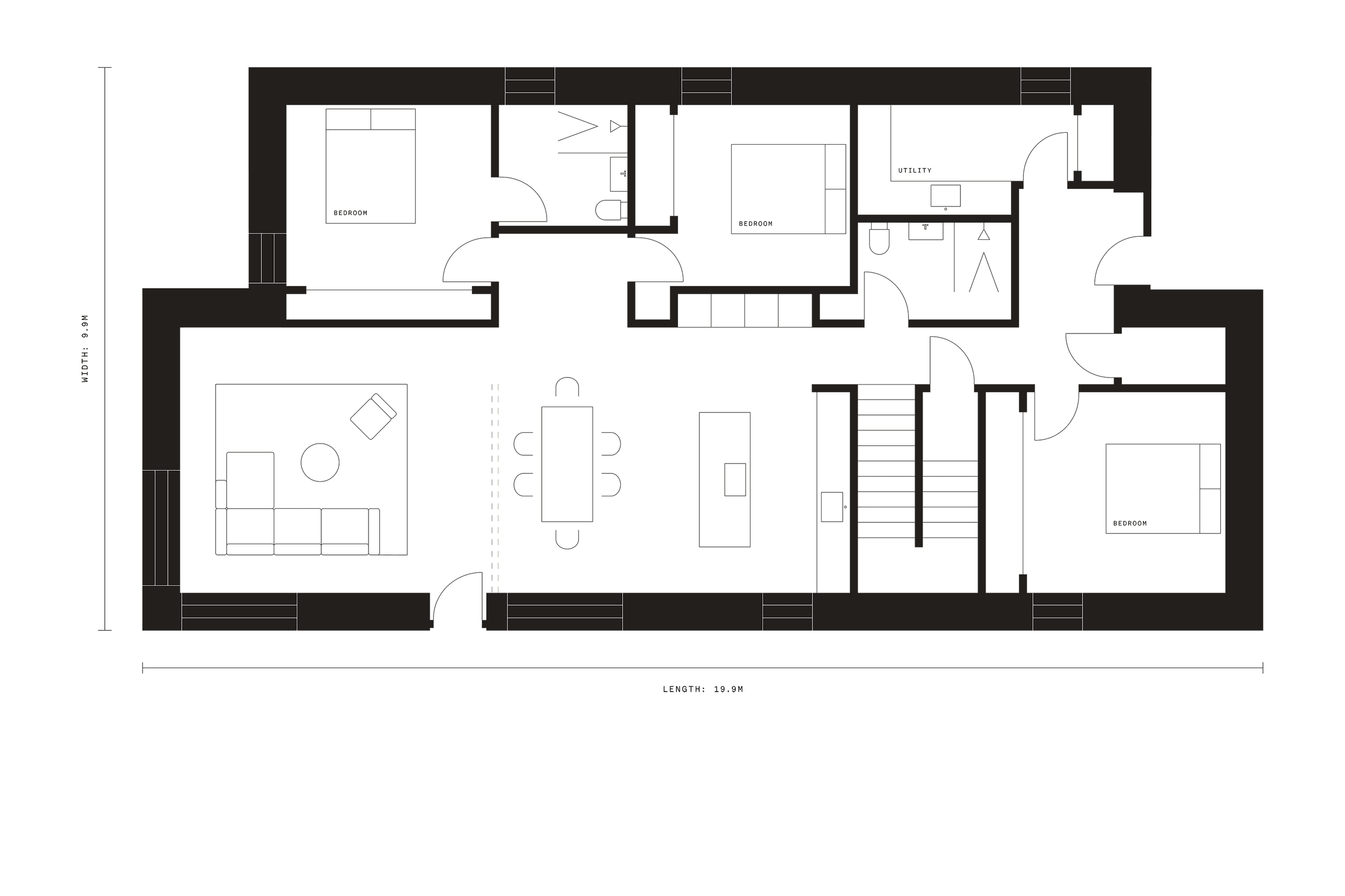
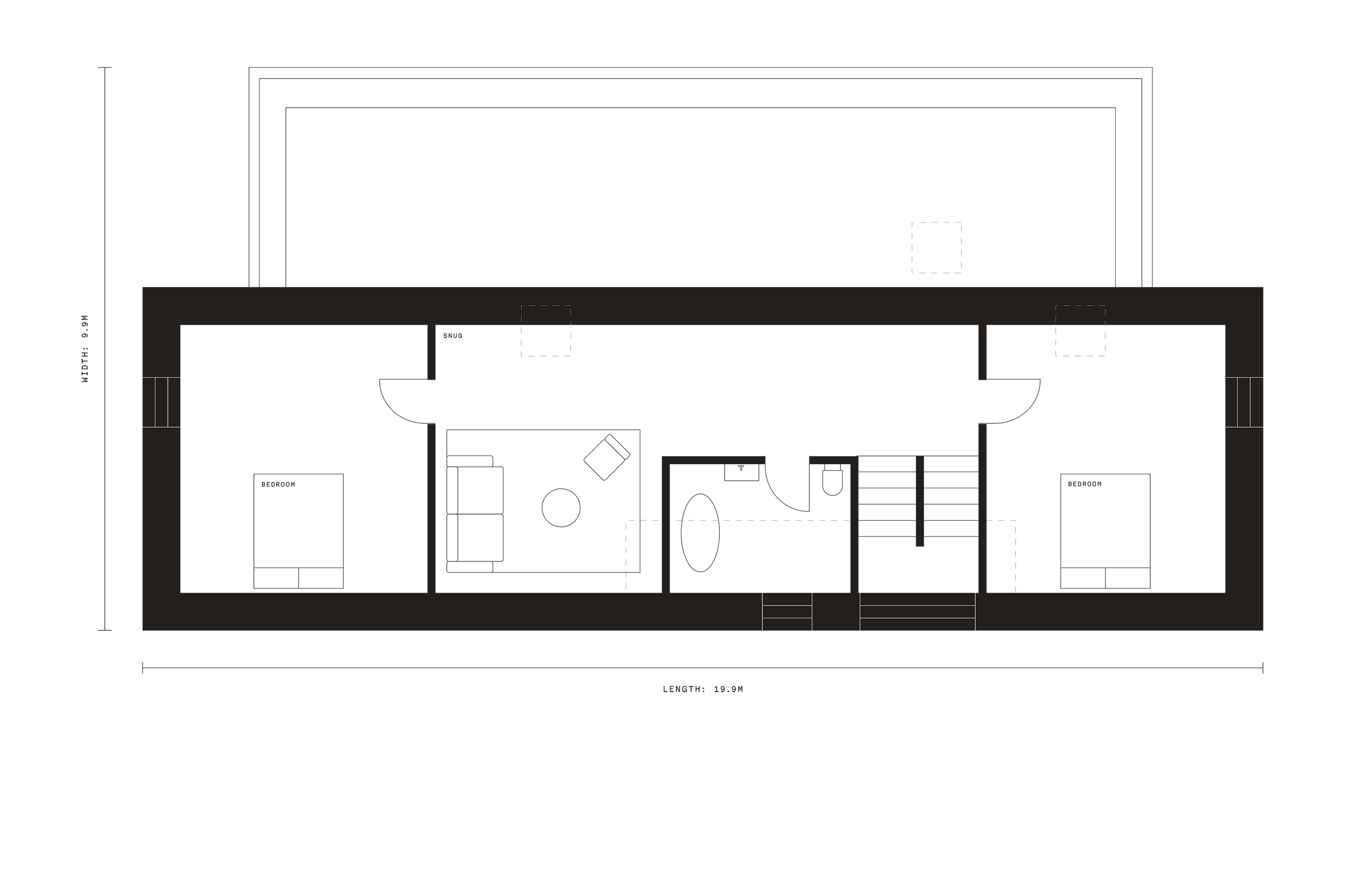
Coldwells Build Passivhaus Range
Pricing
For a detailed cost breakdown of the McKinley and what's included within each build service, select your preferred option below.
Coldwells Build – What's included?
The advertised price is an estimate for the McKinley Passivhaus, built and finished to our classic specification, using our Coldwells Build service. If any work listed below has already been completed, we’ll reduce our fee accordingly. VAT is zero-rated.
Coldwells Build – Price Variables
We provide as much price clarity as we can from the start of the process, but it’s important to understand that various factors will affect the final price of your Coldwells Build Passivhaus. We’ll work with you to firm up costs for the following items, so you can plan your budget with total confidence.
-
We have allowed a provisional cost for planning permission and building warrant fees. We can quote an exact price after liaising with your local council’s planning department
-
Additional third party reports may be required depending on your site conditions. Examples include: tree survey, contaminated land report, ecological surveys (bats & other animals), asbestos report, etc.
-
If needed, this can be included in the contract for an additional cost.
-
Additional costs may be incurred depending on your ground conditions. Extremely boggy land may require deeper excavation and filling with imported hardcore. Rocky ground may require extra labour and time to cut/break through stone. Sloped sites often require extra digging, filling and levelling.
-
We have allowed a provisional cost for transport and can quote an exact price once we know the location of your plot, the number of vehicles needed and site access requirements.
-
This can be included in the contract for an additional cost.
-
Paths, driveways, access roads and patios can be included in the contract for an additional cost.
-
Garden design, including trees, turf and plants can be included in the contract for an additional cost. We’ll connect you with our garden designer.
-
Your Coldwells Build Passivhaus will operate efficiently without these features. However, if you would like to include them, they can be added to the contract for an additional fee.
-
If your plot isn’t already connected to water, electricity and telecoms/broadband, we can include this in the contract for an additional cost.
-
A private septic tank or treatment plant may be needed if you can't connect to a mains sewerage system.
-
A 10-year structural warranty can be included in the contract for an additional cost, provided by Build-Zone, an A-rated insurer. In the UK, mortgage lenders insist all new homes have a Structural Warranty. This is an insurance policy covering the finished home for the first 10 years. It’s the longest that any warranty or insurance policy can run. It’s not related to how long your Passivhaus is expected to last.
-
Our advertised price is based on our classic specification, but you have the option to choose material upgrades.
-
If you want to explore customisations, we’ll be happy to assist. All we ask is that you understand this will inevitably add time, money and additional complexity to your project.
The Coldwells Build Passivhaus is predesigned, so the layout, engineering and Passivhaus modelling have mostly been taken care of. The designs are tried-and-tested to meet Passivhaus certification criteria and draw upon well-planned layouts and established manufacturing methods, refined over many years. Sticking to these designs means you can count on the quality of your finished home and keep the build time and costs as low as possible.
Of course, you can make some minor adjustments to the design, like tweaking layouts or window placements, but big changes that need re-engineering or affect the manufacture of the Coldwells Build Passivhaus aren’t possible without a redesign. It’s all possible, but this redesign would then fall under our Custom Build service.
Coldwells Build – The Process
Building your own home is complicated. As award-winning master builders with a Passivhaus accredited workforce, we understand the process better than most. Our simple 11-step approach outlines exactly how we manage each project through our Coldwells Build service, ensuring clarity and efficiency.
-
- Start your search with our manual, Building Plots: Trusted Advice
- Ensure the land is suitable and fits your budget
- Prepare for the building process by reading our Coldwells Build: Full Turnkey manual
-
- Pick your home from the Coldwells Build Passivhaus range
- Contact us to set up a consultation
- We listen to your ideas and discuss your budget (and deadlines)
- We give you a guide price there and then. This is based on our classic specification for your chosen Passivhaus design
- Learn all about your future home in our manual, Passivhaus: Explained
-
- Read our Passivhaus: Financing Guide for information about green mortgages and government loans
- We partner with specialist lender, Ecology Building Society
- At the end of your build, Ecology rewards certified Passivhaus homes with the top discount (1.5%) off their standard variable rate
-
- We evaluate your site, arranging a ground investigation, topographical survey and reports on drainage, utilities, plot access, etc
- Using these insights, we develop an overall concept design for your Passivhaus, refining the details to suit your site’s unique characteristics
- To guarantee your home meets the Passivhaus standard, it’s modelled, optimised and tested in the Passivhaus Planning Package (PHPP)
- PHPP is specialist software which accurately predicts how much energy is needed to keep your Passivhaus comfortable all year round. It also allows for design iterations to be tested, giving instant results from any change or tweak. These quick comparisons help us optimise your home for maximum energy efficiency, with no guesswork involved
- Our in-house quantity surveyor performs a cost check to ensure the project aligns with your budget, giving you total confidence moving forward
-
- Time to choose from our selection of external finishes, such as cladding, doors and roof materials
- We apply to your local council for planning permission
- For more information about the process, read Planning Permission: A Guide
-
- After obtaining planning permission, we draft building warrant drawings for submission to your council’s building standards service
- You choose from our selection of internal finishes, including flooring, kitchen, bathroom and wall colours
- A fixed and final cost is calculated based on the warrant drawings
- Together, we sign a contract outlining our duties and responsibilities for manufacturing your Coldwells Build Passivhaus
- You get a staged payment plan, so you know how much is due and when
-
- Your Coldwells Build Passivhaus is prefabricated in our Aberdeenshire workshop
- Orders are placed for high-performance windows, doors and a Passivhaus certified ventilation system
- We share a construction programme outlining how long the build will take
-
- We prepare your site including; any demolition, groundworks, foundations and utility connections. We handle it all as quickly, cleanly and quietly as we can.
- We bring your prefabricated Passivhaus to site. It arrives as a set of fully insulated and airtight closed timber wall panels, with cladding, windows and doors pre-installed
- Within days the wall panels are assembled, along with floor and roof cassettes. The roof finish is applied and your Passivhaus is completed externally
- An interim airtightness test is conducted
-
- The internal fit out begins – plumbing, heating, electrics, kitchens, bathrooms, flooring, tiling and decorating. We install everything you’ve selected for your Passivhaus
- A final airtightness test is conducted
- An independent Passivhaus certifier makes sure your home meets the world-leading standard and fixes a plaque to your home to prove its low-energy credentials
- You get a structural warranty certificate
-
- We complete one last check to ensure everything is exactly as it should be before we hand you the keys
- We walk you through your new home, demonstrating how everything works
- You receive an operations manual for your Coldwells Build Passivhaus
-
- We will follow up at 6 months to ensure your home is defect free and resolve any snagging issues
- We ask for your feedback and monitor how your Passivhaus is performing
- We’ll remain your building partner for as long as it suits your needs
Coldwells Build – FAQs
The Coldwells Build option suits those who would prefer to hand over project management, on-site logistics and construction to a team of dedicated experts. Our FAQs will help you decide if it’s right for you.
-
We coordinate delivery with our transport partner to move your Passivhaus in sections, assembling it on site with a crane. Logistics and access are reviewed during our initial site assessment. Transport costs depend on distance and number of vehicles required. We’ll provide an accurate quote once we understand your site specifics. We also handle crane hire and permits.
-
For an estimated price of each Coldwells Build Passivhaus, please view the design range.
-
Our Coldwells Build service is our fixed price turnkey solution for home-builders in Aberdeen and Aberdeenshire. We manage the entire process from start to finish. Simply select your preferred Passivhaus design and we’ll build it for you. Watch your new home come to life, on time and on budget, without lifting a finger.
This table outlines what’s included in the Coldwells Build service compared to our You Build service.
-
Read our manual, Coldwells Build: Full Turnkey. It provides a step-by-step guide to our Coldwells Build service covering – budgeting, plot finding, planning permission, finance, material and product selections, on site construction and more.
-
Prices shown are guide prices based on current market conditions. Due to fluctuations in material and resource costs, prices may be subject to review if significant changes occur beyond our control. Any changes would always be communicated clearly and in advance.
-
Coldwells Build founder, Clare Booth addresses the initial cost differences and explains the long-term savings and benefits of building a Passivhaus.
For more information read our journal, ‘Are Passivhaus Homes More Expensive to Build?’.
-
Currently our Coldwells Build service is only available in Aberdeen and Aberdeenshire. Our You Build service is available throughout the rest of Scotland and the UK.
-
Full details of our construction system can be found on our dedicated Construction System page.
-
If you want to explore customisations, we’ll be happy to assist. All we ask is that you understand this will inevitably add time, money and additional complexity to your project. The Coldwells Build Passivhaus is predesigned, so the layout, engineering and Passivhaus modelling have mostly been taken care of. The designs are tried-and-tested to meet Passivhaus certification criteria and draw upon well-planned layouts and established manufacturing methods, refined over many years. Sticking to these designs means you can count on the quality of your finished home and keep the build time and costs as low as possible.
Of course, you can make some minor adjustments to the design, like tweaking layouts or window placements, but big changes that need re-engineering or affect the manufacture of the Coldwells Build Passivhaus aren’t possible without a redesign. It’s all possible, but this redesign would then fall under our Custom Build service.
If you like the design of the Coldwells Build Passivhaus, but wish to have more control over the interior specification, like kitchens, bathrooms and fitted furniture, the alternative is our You Build service.
-
Coldwells Build founder, Ross Booth explains how we use the Passivhaus standard to build and deliver the world's most energy-efficient, healthy homes.
For more information, read our Coldwells Build manual, Passivhaus: Explained.
-
Yes. Before you start building your Passivhaus, you’ll need full planning permission from your local council. Each council has its own planning policies, as well as national policies which apply locally. Decisions on whether to grant planning permission are based on these. At Coldwells Build, our experienced team will act as your agent, working to maximise your chance of success.
For more information, read our manual, Planning Permission: A Guide.
-
We offer a curated range of options to help you personalise your Passivhaus. With years of experience in custom home-building, we've learned that too many choices can cause decision fatigue. That’s why we’ve simplified the selection process, focusing on modern fixtures and finishes that align with the Coldwells Build Passivhaus aesthetic. You’ll be able to choose from our selection of:
- Roof finishes
- External cladding
- Engineered wood flooring
- Internal lighting
- Scottish-made kitchens
- Floor and wall tiles
- Bathroom fixtures and sanitaryware
- Paint colours
-
Your Passivhaus will arrive on site as a set of fully insulated and airtight closed wall panels, with cladding, windows and doors all pre-installed. In 7-14 days, our highly-skilled team cranes the wall panels into position, along with floor and roof cassettes, to create a complete timber frame structure. The roof finish is applied and your Passivhaus is complete externally.
Then, we get to work on the internal fit out. This includes the kitchen, bathrooms, flooring, decoration, MVHR installation and complete plumbing and electrical works.
In total, the on-site construction of your Coldwells Build Passivhaus will take between 6 to 9 months.
-
We are – Coldwells Build will manage the entire process from start to finish. Watch your new home come to life, on time and on budget, without lifting a finger.
-
Passivhaus takes a ‘fabric first’ approach to energy efficiency, meaning the home’s materials and components [the building fabric] do all the hard work without needing add-on eco technologies. We start by getting the basics right first. From there, we can offer options like solar PV and battery storage if desired.
-
Windows are central to the design language of our Passivhaus homes. Unlike traditional new-builds, the proportions specified in every Coldwells Build Passivhaus home are guaranteed to maximise the amount of natural light in every room and create a sense of continuity with the great outdoors. High performance triple glazing comes as standard – the third pane traps warmth indoors in the colder months and stops your home overheating when it’s hot outside. The spaces between each pane of glass are filled with Argon gas, which functions as an acoustic and thermal insulator. It reduces outdoor noise, prevents cold glass surfaces and eliminates condensation – warding off mould growth and keeping the atmosphere in your home a healthy one.
-
Your home uses a Passivhaus certified mechanical ventilation with heat recovery system [MVHR] that constantly and silently supplies fresh, filtered air while maintaining a comfortable indoor temperature, removing indoor pollutants and balancing internal moisture levels.
Heating and hot water is supplied by a small, economical air source heat pump which uses significantly less fossil fuel than most other systems – better for you and the planet. An electric car charging point comes as standard. Solar PV and battery storage can also be included if requested.
-
A 10-year structural warranty can be added to your contract for an additional cost, provided by Build-Zone, an A-rated insurer. In the UK, mortgage lenders insist all new homes have a Structural Warranty. This is an insurance policy covering the finished home for the first 10 years. It’s the longest that any warranty or insurance policy can run. It’s not related to how long your Passivhaus is expected to last.
-
Yes. Designed to enhance any Coldwells Build Passivhaus, our optional double garage follows the same aesthetic language as the rest of your home. With space for two vehicles, this generous addition provides the perfect space for additional storage or for projects that can’t be completed indoors.
-
Yes. We partner with specialist mortgage provider, Ecology Building Society, experts in funding projects that have positive environmental and social impact. On completion of your Coldwells Build Passivhaus, you’ll be rewarded with Ecology’s top discount [1.5%] off its standard variable rate. The discount is applied to the lifetime of your mortgage.
For more information read our manual, Passivhaus: Financing Guide.
-
To qualify as a Passivhaus in the UK your home must undergo a strict compliance process with an independent third party: the certifier.
The certifier provides impartial verification that all Passivhaus criteria have been met. They check the design drawings and calculations in the PHPP software, they check what’s built on site and ensure it accurately matches the design.
This process is much more rigorous than the typical building regulation inspections and represents the best interests of the homeowner. Designers and contractors are vigilant knowing their work will be checked and verified throughout.
Once it’s confirmed your home meets the criteria, you receive an official Passivhaus plaque. This can be fixed to your home, proving its low-energy credentials and potentially boosting its market value.
For more information about the certification process read our manual, Passivhaus: Explained.
-
Yes. Our Coldwells Build service includes independent Passivhaus certification in the cost. This is important to us, because certification serves as a valuable quality assurance measure, proving we’ve delivered you an exceptionally built home that performs exactly as it’s been designed. It’s the highest mark of construction quality. To learn more about the certification process, read our manual, Passivhaus: Explained.
-
Yes. The Coldwells Build Passivhaus is zero rated for VAT.
-
Good, buildable land takes time and effort to track down. To help guide you along the journey, we’ve produced a comprehensive manual, Building Plots: Trusted Advice. It’s packed with our best advice to spot areas of opportunity.
We also occasionally partner with landowners to offer ready-to-build plots in Scotland, complete with planning permission for a Coldwells Build Passivhaus—so keep an eye on our website for updates.
-
The bulk of your home’s heat is supplied by ‘passive’ sources. These include sunlight, the body heat of occupants and heat generated by household appliances i.e. boiling the kettle, watching television, showering and cooking. In winter, a small, economical air source heat pump will also help top up warmth.
-
No. However, paths, driveways, access roads, patios, trees, turf and plants can be included in the contract for an additional cost.
-
With Passivhaus, we often talk about retaining heat as much as possible, but with increasingly warmer summers, the risk of overheating is factored into the design.
The Passivhaus standard includes an overheating criterion which requires that the home, as a whole, spends less than 10% of the year at temperatures of 25ºC or above.
Whilst this is the absolute maximum requirement, the best practice is to design to 5% or, ideally, 0% above 25°C.
Three of the main issues contributing to overheating in new homes are:
- Inadequate ventilation
- Excess, unshaded glazing
- Excess heat loss from building services such as hot water systems
The Passivhaus design software, PHPP, includes checks to limit all three of these factors to help reduce overheating risk.Passivhaus designers must also "stress test" their designs for future climate conditions. This includes scenarios where windows can’t be opened during hot weather due to issues like pollution or nearby noise from roadwork.
-
While underfloor heating can technically be installed in a Passivhaus, we don’t recommend it, as it would need careful control to avoid overheating.
Living in a Passivhaus is very different from living in a conventional home. The Coldwells Build Passivhaus is so well insulated and ventilated, it maintains a 20-21ºC internal temperature all-year-round.
Step inside on a winter’s day and you’ll feel a subtle, even warmth. Even late at night, windows and bathroom tiles are comfortable to the touch. No matter how cold it gets outside, a Coldwells Build Passivhaus will keep you warm.
-
In the UK, many of us live in homes that simply aren’t comfortable — often draughty, damp and prone to mould. We’ve become so used to cold, leaky homes that we often don’t think about the discomfort they cause. We just turn up the heat, consume more energy and drive up our bills further.
Passivhaus homes are different — they’re designed for maximum comfort and minimal energy use.
Passivhaus takes a ‘fabric first’ approach to energy efficiency, meaning the home's materials and components [the building fabric] do all the hard work without the need for expensive bolt-on eco technologies like solar panels.
Passivhaus homes are packed with higher quality and far greater levels of insulation than modern new builds. The insulation wraps the home like a thermal blanket, reducing heat loss in winter and keeping the interior cool in summer.
Passivhaus homes are airtight, with no gaps for cold draughts to seep in and warm air to leak out. This is achieved through the use of a continuous air barrier that envelopes the entire building – from the walls and roof, to the floors and openings. The design process identifies all potential air leakage paths, and during construction, even the smallest of these gaps are sealed using specialist tapes and adhesives. Anywhere an air leak could occur, Passivhaus makes the extra effort to plug it.
A State-of-the-art ventilation system circulates fresh air 24/7, removing indoor dust, pollen and pollutants. Asthma, eczema and hay fever sufferers should see marked improvements in symptoms. Constant air circulation means your laundry dries fast, cooking odours disappear and your bathroom never steams up.
High performance triple glazing comes as standard. The spaces between each pane of glass are filled with Argon gas, which functions as an acoustic and thermal insulator. It reduces outdoor noise, prevents cold glass surfaces and eliminates condensation – warding off mould growth and keeping the atmosphere in your home a healthy one.
The bulk of the home’s heat is supplied by ‘passive’ sources, including sunlight, the body heat of occupants and electrical appliances [i.e. boiling the kettle, watching tv]. In winter, a small, economical air source heat pump will also help top up warmth. All of this combined results in a comfortable, healthy Passivhaus with hardly any heating bills.
For more information, read our Coldwells Build manual, Passivhaus: Explained.
-
Typically the wall, roof and floor elements in a Passivhaus should aspire to a U-value between 0.10 W/m².K to 0.15 W/m².K. The Coldwells Build Passivhaus eclipses this, with a industry-leading U-value ranging from 0.085 W/m2.K to 0.09W/m2.K. When it comes to energy-efficient construction, it doesn’t get better than this.
-
Your home is fitted with a Passivhaus certified Mechanical Ventilation with Heat Recovery system [MVHR]. These units act as your home’s lungs – continually pulling exhaust from the most pollutant generating rooms [kitchens, bathrooms] and sucking it through a heat exchanger before carrying it to the outside and returning with fresh, filtered air. This entire operation happens silently.
How it works:
- Incoming air is pre-warmed by the outgoing air, so you don’t feel any cold draughts
- All the air in the home changes every 30 minutes
- This prevents the buildup of dust, pollens and odours, reducing hay fever, asthma and eczema triggers
- Constant air circulation means your laundry dries fast, cooking odours disappear and your bathroom never steams up
- Maintenance is a breeze — just swap out the filters periodically
- Careful checks on the design and the installation ensure the MVHR operates effectively and quietly
For more information, read our manual, Passivhaus: Health Benefits.
-
Yes. The Passivhaus standard requires airtight construction to perform to its potential. But this term sometimes causes confusion, with people assuming "airtight" means living in a sealed home with no fresh air. This isn’t the case. Passivhaus homes aren’t hermetically sealed. A ventilation system continually pumps fresh, oxygen-rich air to every room and you always have the option to open windows for extra ventilation if required.
For more information, read our journal, Can I Still Open the Windows in an Airtight Passivhaus?
-
Prefabrication refers to the practice of manufacturing a home in a workshop prior to assembling it on the construction site. The home is delivered in sections, with all necessary components, including wall panels, floor and roof cassettes, windows, doors and other fixtures.
Every Coldwells Build Passivhaus is prefabricated in our Aberdeenshire workshop. Off-site construction reduces waste, time and costs. With no weather constraints, there’s no downtime or delays.
Systematic, methodical and simplified, our skilled team can guarantee build quality, air-tightness and energy efficiency. With its clean [relatively] quiet construction and speedy assembly, there’ll be minimal carbon emissions or disruption to your neighbours.
-
Scotland has set an ambitious target to reach net zero carbon emissions by 2045. To help achieve these goals, some local councils are supporting Passivhaus projects, recognising their role in reducing carbon emissions. These councils offer incentives like faster planning approvals, waived or discounted fees and extra support during the application process.
You Build – What's Included?
The advertised price is an estimate for the McKinley Passivhaus, built to our classic specification, using our You Build service. If any work listed below has already been completed, we'll reduce our fee accordingly. VAT is zero-rated.
You Build – Price Variables
We try to provide as much price clarity as we can, but it’s important to understand various factors will affect the final price of your Coldwells Build Passivhaus. Your local main contractor will quote for and manage all parts of the project outside the boundaries of our You Build service.
-
We have allowed a provisional cost for planning permission and building warrant fees. We can quote an exact price after liaising with your local council’s planning department.
-
Additional third party reports may be required depending on your site conditions. Examples include: tree survey, contaminated land report, ecological surveys (bats & other animals), asbestos report, etc.
-
If needed, this will be overseen and priced by your local main contractor.
-
This will be managed and priced by your local main contractor. We will provide the necessary engineer-approved construction drawings and stay closely involved with your on-site team, providing support and ensuring the work aligns with our quality standards.
-
This will be managed and priced by your local main contractor. We will provide the necessary engineer-approved construction drawings and stay closely involved with your on-site team, providing support and ensuring the work aligns with our quality standards.
-
For an additional cost, we can supply engineered wood flooring, which has been chosen in keeping with the Coldwells Build Passivhaus aesthetic.
-
For an additional cost, we can supply wall and floor tiles, which have been chosen in keeping with the Coldwells Build Passivhaus aesthetic.
-
To be sourced and supplied by you or your local main contractor.
-
To be sourced and supplied by you or your local main contractor.
-
To be sourced and supplied by you or your local main contractor.
-
To be sourced and supplied by you or your local main contractor.
-
We have allowed a provisional cost for transport and can quote an exact price once we know the location of your plot, the number of vehicles needed and site access requirements.
-
This can be included in the contract for an additional cost.
-
Paths, driveways, access roads and patios can be overseen and priced by your local main contractor.
-
Turf, trees and plants can be overseen and priced by your local main contractor.
-
To be overseen and priced by your local main contractor. You’ll need tradespeople to install plumbing, electrics, kitchen, bathrooms, flooring, tiling, heating system, plastering and decoration. We will provide the necessary construction drawings and stay engaged throughout to provide specialist advice and support.
-
For an additional cost, we can supply internal door sets and skirting boards, which your local main contractor can install.
-
Your Coldwells Build Passivhaus will operate efficiently without these features. However, if you would like to include them, they can be arranged and priced by your local main contractor.
-
If your plot isn’t already connected to water, electricity and telecoms/broadband, this will need to be overseen and priced by your local main contractor.
-
To be overseen and priced by your local main contractor.
-
A private septic tank or treatment plant may be needed if you can't connect to a mains sewerage system. This will be overseen and priced by your local main contractor.
-
To be overseen and priced by your local main contractor.
-
To be overseen by your local main contractor.
-
A 10-year structural warranty can be included in the contract for an additional cost, provided by Build-Zone, an A-rated insurer. In the UK, mortgage lenders insist all new homes have a Structural Warranty. This is an insurance policy covering the finished home for the first 10 years. It’s the longest that any warranty or insurance policy can run. It’s not related to how long your Passivhaus is expected to last.
-
Can be included in the contract for an additional cost. Coldwells Build will arrange for an independent Passivhaus certifier to confirm your home meets the world-leading standard. A Passivhaus plaque will be fixed to your home to prove its low-energy credentials. It serves as a valuable quality assurance measure, providing certainty and confidence that you’re living in an exceptionally built, low-energy home that performs exactly as it's been designed.
-
To be overseen by your local main contractor.
-
Our advertised price is based on our classic specification, but you have the option to choose material upgrades.
-
If you want to explore customisations, we’ll be happy to assist. All we ask is that you understand this will inevitably add time, money and additional complexity to your project.
The Coldwells Build Passivhaus is predesigned, so the layout, engineering and Passivhaus modelling have mostly been taken care of. The designs are tried-and-tested to meet Passivhaus certification criteria and draw upon well-planned layouts and established manufacturing methods, refined over many years. Sticking to these designs means you can count on the quality of your finished home and keep the build time and costs as low as possible.
Of course, you can make some minor adjustments to the design, like tweaking layouts or window placements, but big changes that need re-engineering or affect the manufacture of the Coldwells Build Passivhaus aren’t possible without a redesign. It’s all possible, but this redesign would then fall under our Custom Build service.
You Build – The Process
Building your own home is complicated. As award-winning master builders with a Passivhaus accredited workforce, we understand the process better than most. Our simple 10-step approach outlines exactly how we manage your project through our You Build service.
-
- Start your search with our manual, Building Plots: Trusted Advice
- Ensure the land is suitable and fits your budget
- Prepare for the building process by reading our You Build: Supply & Assemble manual
-
- Pick your home from the Coldwells Build Passivhaus range
- Contact us to set up a consultation
- We listen to your ideas and discuss your budget (and deadlines)
- We give you a guide price there and then. This is based on our classic specification for your chosen Passivhaus design.
- Learn all about your future home in our manual, Passivhaus: Explained
-
- Read our Passivhaus: Financing Guide for information about green mortgages and government loans
- We partner with specialist lender, Ecology Building Society
- At the end of your build, Ecology rewards certified Passivhaus homes with the top discount (1.5%) off their standard variable rate
-
- We evaluate your site, arranging a ground investigation, topographical survey and reports on drainage, utilities, plot access, etc
- Using these insights, we develop an overall concept design for your Passivhaus, refining the details to suit your site’s unique characteristics
- To guarantee your home meets the Passivhaus standard, it’s modelled, optimised and tested in the Passivhaus Planning Package (PHPP)
- PHPP is specialist software which accurately predicts how much energy is needed to keep your Passivhaus comfortable all year round. It also allows for design iterations to be tested, giving instant results from any change or tweak. These quick comparisons help us optimise your home for maximum energy efficiency, with no guesswork involved
- Our in-house quantity surveyor performs a cost check to ensure the project aligns with your budget, giving you total confidence moving forward
-
- Time to add your personal touch by choosing from our selection of external finishes, including cladding, doors and roof materials
- We apply to your local council for planning permission
- Read Planning Permission: A Guide for more information about the process
-
- After obtaining planning permission, we draft building warrant drawings for submission to your council’s building standards service
- A fixed and final cost is calculated based on the warrant drawings
- Together, we sign a contract outlining our duties and responsibilities for manufacturing your Coldwells Build Passivhaus
- You get a staged payment plan, so you know how much is due and when
-
- Your Coldwells Build Passivhaus is prefabricated in our Aberdeenshire workshop
- Orders are placed for high-performance windows and external doors
- You appoint a local main contractor to manage and quote for all parts of the project outside the boundaries of our You Build service (for example, site prep, foundations, internal fit out)
- Or, if you have the time, a good grip of your finances and excellent planning skills, this is the point where you’ll need to employ your own subcontractors and manage the build yourself
-
- We share engineer-stamped construction drawings with your main contractor
- You get a construction programme, which breaks down trades required on site and when
- Your main contractor begins site prep, including demolition, groundworks, foundations, etc.
- We liaise with you and your main contractor to discuss delivery dates for your Passivhaus
-
- We bring your prefabricated Passivhaus to site. It arrives as a set of fully insulated and airtight closed wall panels, with cladding, windows and doors all pre-installed
- In days, our highly-skilled team cranes the wall panels into position, along with floor and roof cassettes, to create a complete timber frame structure
- The roof finish is applied and your Passivhaus is complete externally
- An interim airtightness test is conducted
- We walk through your home and hold an induction session with you and your main contractor to communicate key requirements for working in a Passivhaus
- Your contract with Coldwells Build concludes at this point. However, we’ll stay engaged throughout the construction phase to provide specialist advice and support
-
- You (and your main contractor) take control of the internal fit out
- You’ll receive a comprehensive list of material and product recommendations carefully selected by our design team
- If preferred, we can supply certain materials – for example, engineered wood flooring, tiles, door sets, which have been chosen in keeping with the Coldwells Build Passivhaus aesthetic
- Plumbing, heating, electrics, kitchen, bathrooms, flooring, tiling, ventilation, decorating are installed & a final airtightness test conducted
- If desired, we can organise an independent Passivhaus certifier to confirm your home meets the world-leading standard. You’ll get a plaque to display on your home to prove its low-energy credentials.
You Build – FAQs
If you have experience in construction or self-build project management, our You Build service could be the ideal option. In the table below, we cover the questions we are most frequently asked.
-
For an estimated price of each Coldwells Build Passivhaus, please view the design range.
-
Prices shown are guide prices based on current market conditions. Due to fluctuations in material and resource costs, prices may be subject to review if significant changes occur beyond our control. Any changes would always be communicated clearly and in advance.
-
The prefabricated panels used in the Coldwells Build Passivhaus are built in accordance with a structural engineer’s design and are accompanied by a Structural Engineers Register [SER] certificate. This confirms that your Passivhaus meets all the required structural standards and is sufficient to do the job asked of it. It covers all elements of the build, including the foundations.
- Modern Methods of Construction:
Our panels are manufactured in our Aberdeenshire workshop under controlled conditions. The quality of each panel is checked and signed off at various stages before being delivered to site as a set of fully insulated closed wall panels, with cladding, windows and doors pre-installed.
- Passivhaus Certification:
Our designs exceed UK building regulations and are eligible for Passivhaus certification – the global gold standard of energy-efficient construction.
To qualify as a Passivhaus, your home must undergo a strict compliance process, with an independent Passivhaus certifier. They check the architectural drawings, they check what’s built on site and ensure it matches the design accurately.
These steps add up to a robust quality assurance process, much more rigorous than the typical building regulation inspections. Designers and builders remain vigilant knowing their work will be checked and verified throughout .
When the certifier is satisfied all criteria are met, you receive an official Passivhaus plaque. This can be fixed to your home to prove its world-class qualifications. It provides certainty and confidence that you’re living in an exceptionally built, low-energy home that performs exactly as it's been designed.
- Modern Methods of Construction:
-
Our You Build service is available UK wide.
-
You Build is an easy, economical option suited to UK self-builders. Select your Coldwells Build Passivhaus and we’ll manage planning permission, manufacture, delivery and assembly. We hand it over fully finished externally – weathertight and airtight, and leave the interior to you and your main contractor.
This covers, but isn’t limited to:
- Site assessment – including ground investigation, topographical survey and reports on drainage, utilities, plot access, etc
- Architectural design, Passivhaus modelling & engineering
- An introduction to green mortgage providers who offer discounts for Passivhaus homes
- Planning permission & building warrant application
- Manufacture of your Coldwells Build Passivhaus
- Delivery to your site
- Assembly of your Passivhaus, so it’s fully finished externally, including cladding, windows, doors and roof finish
- Ventilation unit installation [MVHR]
- Interim airtightness test
This table outlines what’s included in the You Build service compared to our Coldwells Build service. -
Read our manual, You Build: Supply & Assemble. It provides a step-by-step guide to our You Build service covering – budgeting, plot finding, planning permission, finance, on site construction and more.
-
To qualify as a Passivhaus in the UK your home must undergo a strict compliance process with an independent third party: the certifier.
The certifier provides impartial verification that all Passivhaus criteria have been met. They check the design drawings and calculations in the PHPP software, they check what’s built on site and ensure it accurately matches the design.
This process is much more rigorous than the typical building regulation inspections and represents the best interests of the homeowner. Designers and contractors are vigilant knowing their work will be checked and verified throughout.
Once it’s confirmed your home meets the criteria, you receive an official Passivhaus plaque. This can be fixed to your home, proving its low-energy credentials and potentially boosting its market value.
For more information about the certification process read our manual, ‘Passivhaus: Explained’
-
No. Passivhaus certification isn’t included with our You Build service. However, we can arrange this for an additional cost.
-
Typically the wall, roof and floor elements in a Passivhaus should aspire to a U-value between 0.10 W/m².K to 0.15 W/m².K. The Coldwells Build Passivhaus eclipses this, with a industry-leading U-value ranging from 0.085 W/m2.K to 0.09W/m2.K. When it comes to energy-efficient construction, it doesn’t get better than this.
-
No. We’re able to zero rate the VAT when using our You Build service, helping with your cash flow.
-
Coldwells Build founder, Clare Booth addresses the initial cost differences and explains the long-term savings and benefits of building a Passivhaus.
For more information read our journal, ‘Are Passivhaus Homes More Expensive to Build?’.
-
Currently, we only offer our turnkey Coldwells Build service in Aberdeen and Aberdeenshire.
-
If you want to explore customisations, we’ll be happy to assist. All we ask is that you understand this will inevitably add time, money and additional complexity to your project. The Coldwells Build Passivhaus is predesigned, so the layout, engineering and Passivhaus modelling have mostly been taken care of. The designs are tried-and-tested to meet Passivhaus certification criteria and draw upon well-planned layouts and established manufacturing methods, refined over many years. Sticking to these designs means you can count on the quality of your finished home and keep the build time and costs as low as possible.
Of course, you can make some minor adjustments to the design, like tweaking layouts or window placements, but big changes that need re-engineering or affect the manufacture of the Coldwells Build Passivhaus aren’t possible without a redesign. It’s all possible, but this redesign would then fall under our Custom Build service.
-
Yes. Before you start building your Passivhaus, you’ll need full planning permission from your local council. Each council has its own planning policies, as well as national policies which apply locally. Decisions on whether to grant planning permission are based on these. At Coldwells Build, our experienced team will act as your agent, working to maximise your chance of success.
For more information, read our manual, Planning Permission: A Guide.
-
Your Coldwells Build Passivhaus will include:
- Thermally modified timber cladding in your choice of colour
- High-performance, triple-glazed windows
- External doors with triple glazing, additional locking points, specialist hinges and extra seals
- Roof finish
-
Referrals can be incredibly helpful if you have friends or family who’ve previously built their own home. The Federation of Master Builders ‘Find a Builder’ directory has a list of reputable, local main contractors. Those with a strong presence online normally have great customer service and are happy for their clients to review and rate their performance. Other useful things to look out for are a recently updated website, social media or online videos showcasing their previous work.
Read our You Build: Supply & Assemble manual for more information about the main contractor’s role.
-
Your Passivhaus will arrive on site as a set of fully insulated and airtight closed wall panels, with cladding, windows and doors all pre-installed. In 7-14 days, our highly-skilled team cranes the wall panels into position, along with floor and roof cassettes, to create a complete timber frame structure. The roof finish is applied and your Passivhaus is complete externally.
For more information, see our construction system page.
-
Coldwells Build is accountable for driving and coordinating the first stage of your project, including planning permission, manufacture, delivery and assembly of your Passivhaus.
Most clients appoint a main contractor to manage and quote for the parts of the project outside the boundaries of our You Build service, such as:
- Foundations
- Groundworks
- Internal fit out
- Decoration
- Service connections
- Landscaping
Or, if you have the time, a good grip of your finances and excellent planning skills, you can employ your own subcontractors and manage the build yourself.
To help you decide the best course of action, read our manual, You Build: Supply & Assemble.
-
A main contractor manages and quotes for all the parts of the project outside the boundaries of our You Build service. They’re responsible for making sure work is delivered on time and budget. They are a respected consultant, with excellent planning, communication and leadership skills. Your main contractor will:
- Prepare your site and coordinate with Coldwells Build for the delivery of your Passivhaus
- Employ their trusted subcontractors [i.e. plumbers, electricians, painters, air testers] to fit out your Passivhaus once it’s erected by Coldwells Build
- Order and take delivery of materials and products
- Liaise with building inspectors
- Supply equipment and machinery
- Manage site health and safety
- Pay subcontractors
We'll provide your main contractor with our comprehensive construction drawings and communicate directly with them [and you]. This ensures clarity regarding roles and responsibilities, keeping everyone aligned to achieve a common goal. -
Project managing your own build will save you money. However, unless you have extensive construction experience, can be extremely flexible with your time and are confident coordinating multiple tradespeople, it might not be the right option for you.
To help you decide the best course of action, read our manual, You Build: Supply & Assemble.
-
No. This work will be managed by your local main contractor. We'll supply them with our detailed construction drawings and stay engaged throughout the process to provide specialist advice and support. Once this work is complete, Coldwells Build will deliver and assemble your Passivhaus on site.
For a step-by-step guide of the full You Build process, read our manual, You Build: Supply & Assemble.
-
We coordinate delivery with our transport partner to move your Passivhaus in sections, assembling it on site with a crane. Logistics and access are reviewed during our initial site assessment. Transport costs depend on distance and number of vehicles required. We’ll provide an accurate quote once we understand your site specifics. We also handle crane hire and permits.
-
We will complete your Passivhaus externally, including the roof finish. After that, we’ll move onto:
- Interim airtightness test:
An interim airtightness test ensures your home is on track to hit the strict airtightness targets Passivhaus demands. Your main contractor will arrange a final airtightness test at the end of the build.
- Induction session:
Before leaving the site, we walk through your home and hold an induction session with you and your main contractor to communicate key requirements for working in a Passivhaus. However, the building process from this point on is not vastly different to a conventional home.
- Contract ends:
Your contract with Coldwells Build concludes and we hand the project back to you and your main contractor to complete the internal fit out. However, we’ll stay engaged throughout the construction phase to provide specialist advice and support
- Passivhaus certification:
If desired, we can organise an independent Passivhaus certifier to confirm your home meets the world-leading standard. You’ll get a plaque to display on your home to prove its low-energy credentials.
Read our manual, You Build: Supply & Assemble for a step-by-step guide of the full You Build process.
- Interim airtightness test:
-
Once we’ve assembled your Passivhaus, you and/or your main contractor will take charge, coordinating the internal fit out.
Specialist tradespeople will be needed to install plumbing, heating, electrics, kitchens, bathrooms, flooring, tiling, plastering and decoration. We’ll supply detailed construction drawings and stay engaged throughout the process to provide specialist advice and support.
Our You Build service gives you the flexibility to complete the interior to your own specification. You can choose your own kitchen, bathrooms, flooring and wall colours from your preferred suppliers.
We can also supply certain materials – for example, engineered wood flooring, tiles and door sets, which have been chosen in keeping with the Coldwells Build Passivhaus aesthetic. For a complete list of what we offer, see the What’s Included table.
For a step-by-step guide of the full You Build process, read our You Build: Supply & Assemble manual.
-
Windows are central to the design language of our Passivhaus homes. Unlike traditional new-builds, the proportions specified in every Coldwells Build Passivhaus home are guaranteed to maximise the amount of natural light in every room and create a sense of continuity with the great outdoors. High performance triple glazing comes as standard – the third pane traps warmth indoors in the colder months and stops your home overheating when it’s hot outside. The spaces between each pane of glass are filled with Argon gas, which functions as an acoustic and thermal insulator. It reduces outdoor noise, prevents cold glass surfaces and eliminates condensation – warding off mould growth and keeping the atmosphere in your home a healthy one.
-
Good, buildable land takes time and effort to track down. To help guide you along the journey, we’ve produced a comprehensive manual, Building Plots: Trusted Advice. It’s packed with our best advice to spot areas of opportunity.
We also occasionally partner with landowners to offer ready-to-build plots in Scotland, complete with planning permission for a Coldwells Build Passivhaus—so keep an eye on our website for updates.
-
Coldwells Build founder, Ross Booth explains how we use the Passivhaus standard to build and deliver the world's most energy-efficient, healthy homes.
For more information, read our Coldwells Build manual, Passivhaus: Explained.
-
Yes. In the UK, mortgage lenders insist all new homes have a 10-year Structural Warranty. This is an insurance policy covering the finished home for 10 years from the date on the completion certificate. It’s the longest that any warranty or insurance policy can run. It’s not related to how long your Passivhaus is expected to last. We can connect you with an A rated insurer, who will help facilitate this for you.
-
Yes. Designed to enhance any Coldwells Build Passivhaus, our optional double garage follows the same aesthetic language as the rest of your home. With space for two vehicles, this generous addition provides the perfect space for additional storage or for projects that can’t be completed indoors.
-
Yes. We partner with specialist mortgage provider, Ecology Building Society, experts in funding projects that have positive environmental and social impact. On completion of your Coldwells Build Passivhaus, you’ll be rewarded with Ecology’s top discount [1.5%] off its standard variable rate. The discount is applied to the lifetime of your mortgage.
For more information read our manual, Passivhaus: Financing Guide.
-
The bulk of your home’s heat is supplied by ‘passive’ sources. These include sunlight, the body heat of occupants and heat generated by household appliances – i.e. boiling the kettle, watching television, showering and cooking. In winter, a small, economical air source heat pump will also help top up warmth.
-
With Passivhaus, we often talk about retaining heat as much as possible, but with increasingly warmer summers, the risk of overheating is factored into the design.
The Passivhaus standard includes an overheating criterion which requires that the home, as a whole, spends less than 10% of the year at temperatures of 25ºC or above.
Whilst this is the absolute maximum requirement, the best practice is to design to 5% or, ideally, 0% above 25°C.
Three of the main issues contributing to overheating in new homes are:
- Inadequate ventilation
- Excess, unshaded glazing
- Excess heat loss from building services such as hot water systems
The Passivhaus design software, PHPP, includes checks to limit all three of these factors to help reduce overheating risk.Passivhaus designers must also "stress test" their designs for future climate conditions. This includes scenarios where windows can’t be opened during hot weather due to issues like pollution or nearby noise from roadwork.
-
While underfloor heating can technically be installed in a Passivhaus, we don’t recommend it, as it would need careful control to avoid overheating.
Living in a Passivhaus is very different from living in a conventional home. The Coldwells Build Passivhaus is so well insulated and ventilated, it maintains a 20-21ºC internal temperature all-year-round.
Step inside on a winter’s day and you’ll feel a subtle, even warmth. Even late at night, windows and bathroom tiles are comfortable to the touch. No matter how cold it gets outside, a Coldwells Build Passivhaus will keep you warm.
-
Yes. The Passivhaus standard requires airtight construction to perform to its potential. But this term sometimes causes confusion, with people assuming "airtight" means living in a sealed home with no fresh air. This isn’t the case. Passivhaus homes aren’t hermetically sealed. A ventilation system continually pumps fresh, oxygen-rich air to every room and you always have the option to open windows for extra ventilation if required.
For more information, read our journal, Can I Still Open the Windows in an Airtight Passivhaus?
-
In the UK, many of us live in homes that simply aren’t comfortable — often draughty, damp and prone to mould. We’ve become so used to cold, leaky homes that we often don’t think about the discomfort they cause. We just turn up the heat, consume more energy and drive up our bills further.
Passivhaus homes are different — they’re designed for maximum comfort and minimal energy use.
Passivhaus takes a ‘fabric first’ approach to energy efficiency, meaning the home's materials and components [the building fabric] do all the hard work without the need for expensive bolt-on eco technologies like solar panels.
Passivhaus homes are packed with higher quality and far greater levels of insulation than modern new builds. The insulation wraps the home like a thermal blanket, reducing heat loss in winter and keeping the interior cool in summer.
Passivhaus homes are airtight, with no gaps for cold draughts to seep in and warm air to leak out. This is achieved through the use of a continuous air barrier that envelopes the entire building – from the walls and roof, to the floors and openings. The design process identifies all potential air leakage paths, and during construction, even the smallest of these gaps are sealed using specialist tapes and adhesives. Anywhere an air leak could occur, Passivhaus makes the extra effort to plug it.
A State-of-the-art ventilation system circulates fresh air 24/7, removing indoor dust, pollen and pollutants. Asthma, eczema and hay fever sufferers should see marked improvements in symptoms. Constant air circulation means your laundry dries fast, cooking odours disappear and your bathroom never steams up.
High performance triple glazing comes as standard. The spaces between each pane of glass are filled with Argon gas, which functions as an acoustic and thermal insulator. It reduces outdoor noise, prevents cold glass surfaces and eliminates condensation – warding off mould growth and keeping the atmosphere in your home a healthy one.
The bulk of the home’s heat is supplied by ‘passive’ sources, including sunlight, the body heat of occupants and electrical appliances [i.e. boiling the kettle, watching tv]. In winter, a small, economical air source heat pump will also help top up warmth. All of this combined results in a comfortable, healthy Passivhaus with hardly any heating bills.
For more information, read our Coldwells Build manual, Passivhaus: Explained.
-
Your home is fitted with a Passivhaus certified Mechanical Ventilation with Heat Recovery system [MVHR]. These units act as your home’s lungs – continually pulling exhaust from the most pollutant generating rooms [kitchens, bathrooms] and sucking it through a heat exchanger before carrying it to the outside and returning with fresh, filtered air. This entire operation happens silently.
How it works:
- Incoming air is pre-warmed by the outgoing air, so you don’t feel any cold draughts
- All the air in the home changes every 30 minutes
- This prevents the buildup of dust, pollens and odours, reducing hay fever, asthma and eczema triggers
- Constant air circulation means your laundry dries fast, cooking odours disappear and your bathroom never steams up
- Maintenance is a breeze — just swap out the filters periodically
- Careful checks on the design and the installation ensure the MVHR operates effectively and quietly
For more information, read our manual, Passivhaus: Health Benefits.
-
Prefabrication refers to the practice of manufacturing a home in a workshop prior to assembling it on the construction site. The home is delivered in sections, with all necessary components, including wall panels, floor and roof cassettes, windows, doors and other fixtures.
Every Coldwells Build Passivhaus is prefabricated in our Aberdeenshire workshop. Off-site construction reduces waste, time and costs. With no weather constraints, there’s no downtime or delays.
Systematic, methodical and simplified, our skilled team can guarantee build quality, air-tightness and energy efficiency. With its clean [relatively] quiet construction and speedy assembly, there’ll be minimal carbon emissions or disruption to your neighbours.
-
Scotland has set an ambitious target to reach net zero carbon emissions by 2045, with the rest of the UK aiming for 2050. To help achieve these goals, some local councils are supporting Passivhaus projects, recognising their role in reducing carbon emissions. These councils offer incentives like faster planning approvals, waived or discounted fees and extra support during the application process. Councils which support Passivhaus projects include Midlothian, Hereford, Camden and Sutton.
Ready to Buildthe McKinley?
Take the first step towards making it happen by booking a 15-minute call with our director and Passivhaus certified tradesperson, Ross Booth.

Discover More
Interested in the McKinley?
If you're ready to start your Passivhaus project, fill out the form below – and we’ll be in touch with you within 48 hours.

Register your interest in McKinley
Enquiry received
You're one step closer to a Passivhaus. Thanks for your enquiry. We'll be in touch by email within 48 hours.

Coldwells Build Passivhaus
See All Designs











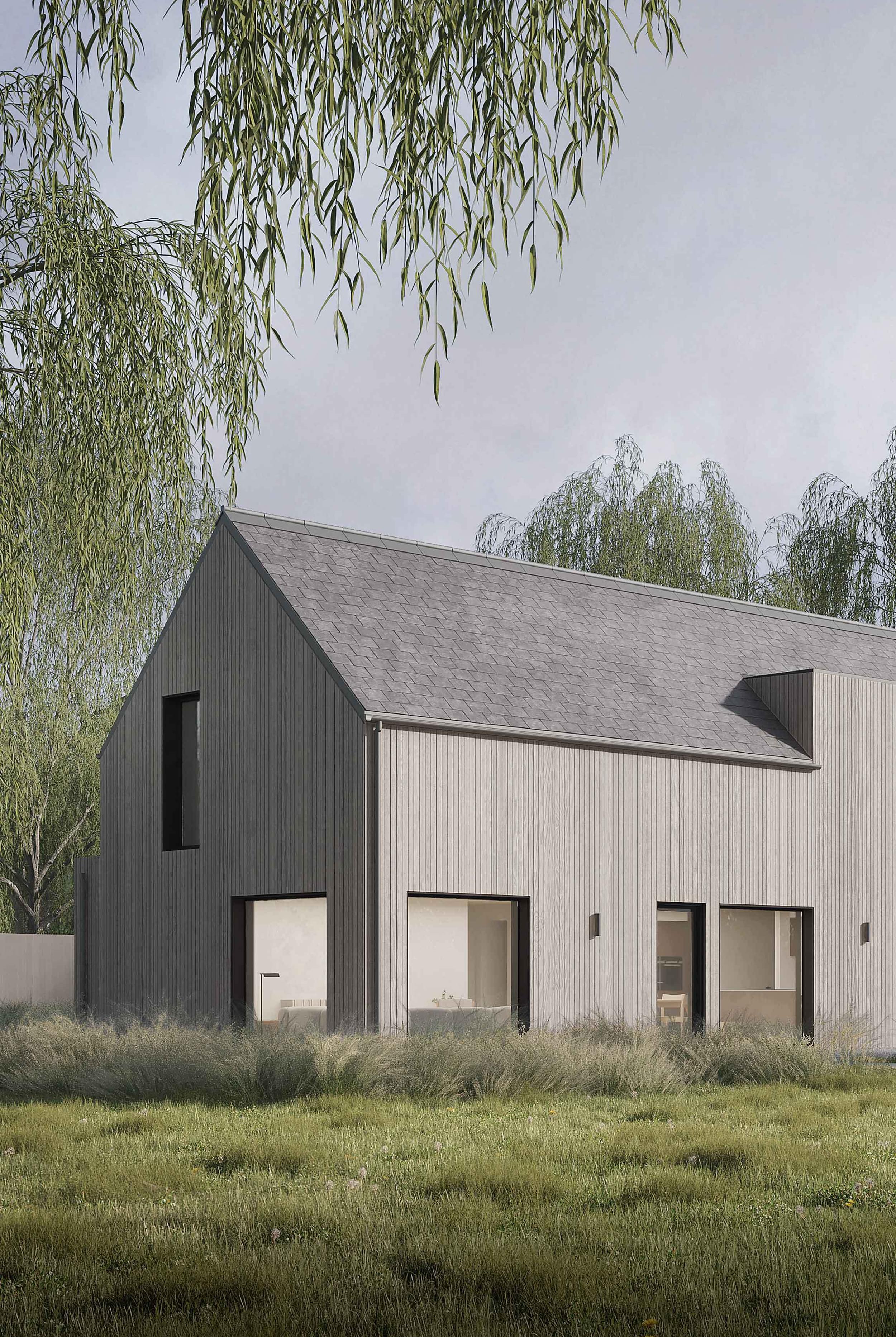

The ability for our build to be Passivhaus was the icing on the cake and really set Coldwells Build apart from other providers we’d been considering.
Clients: Lauren & Luke Cammaert-Norris | Building the Argyle Passivhaus




